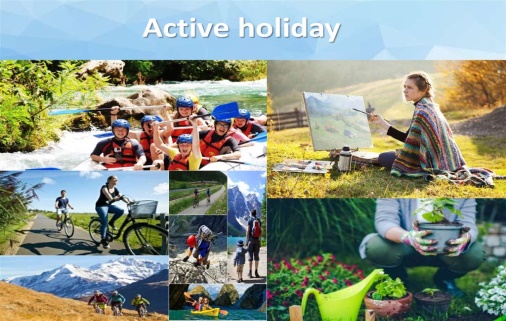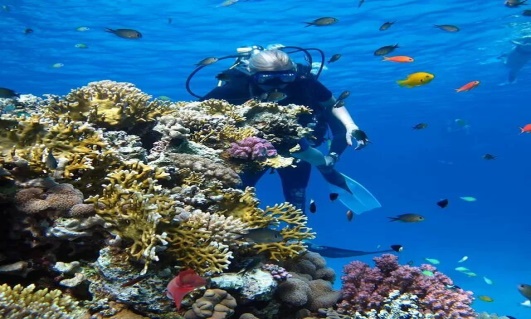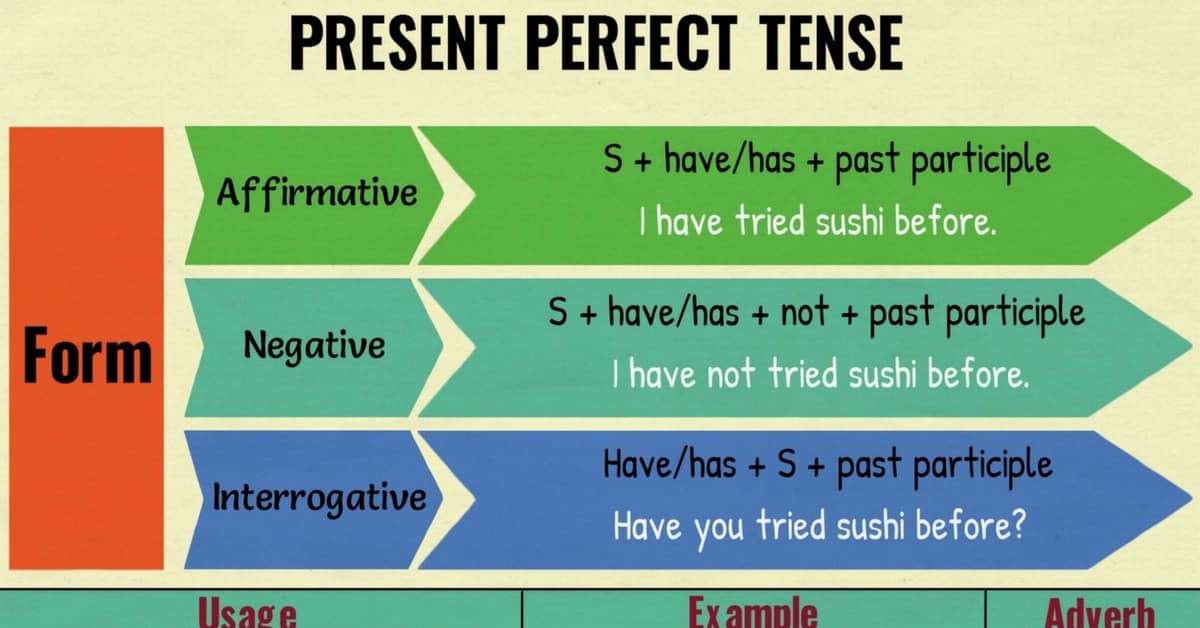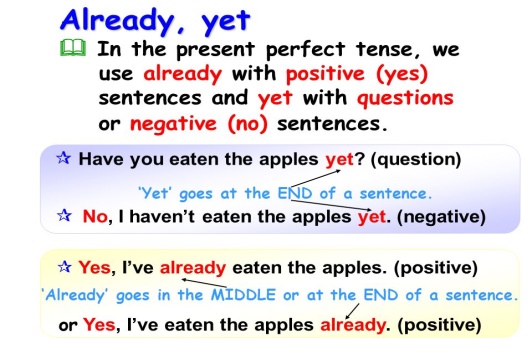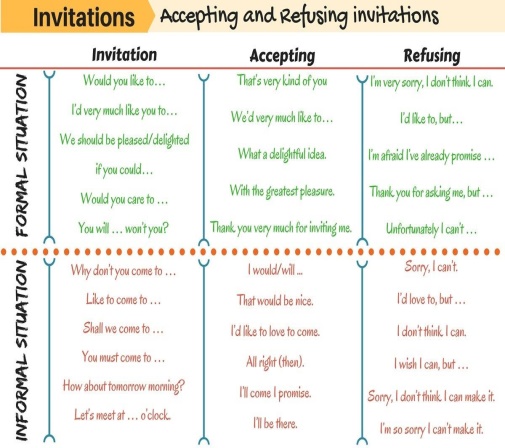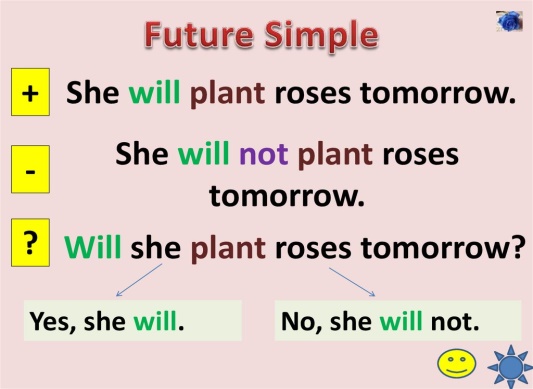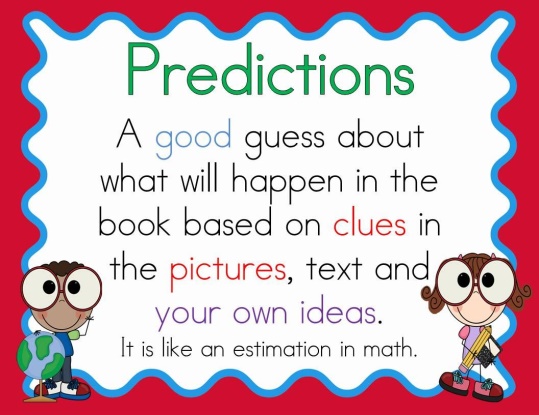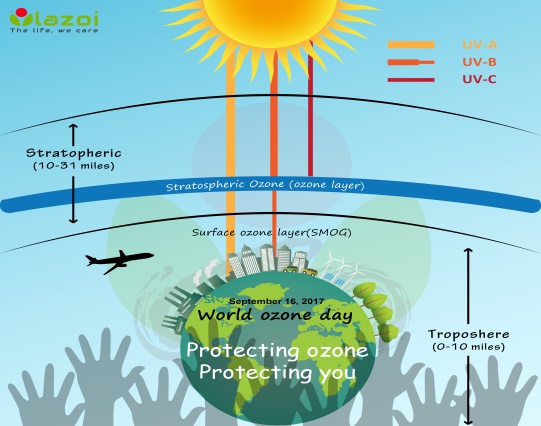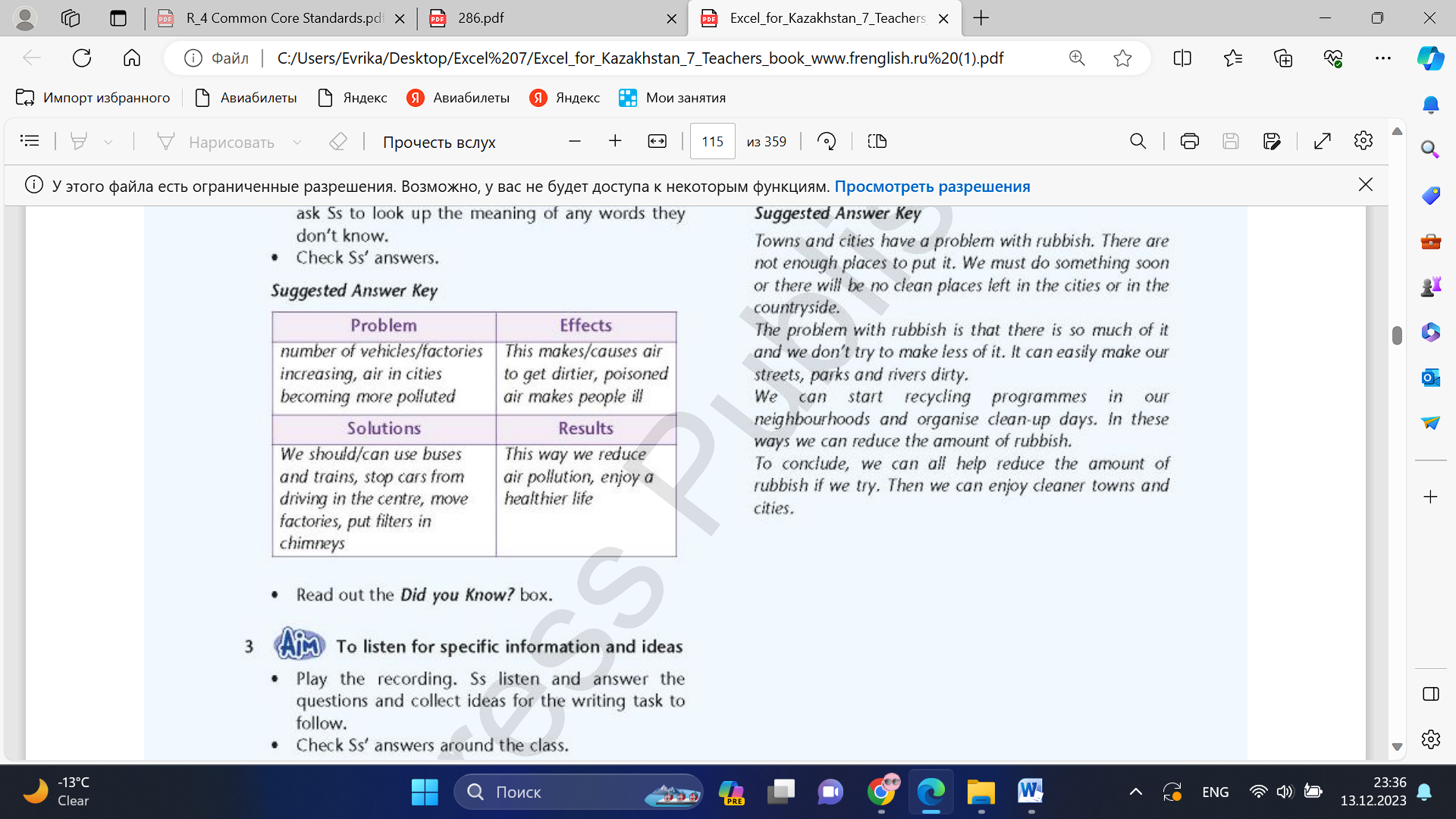Бұл материал сайт қолданушысы жариялаған. Материалдың ішінде жазылған барлық ақпаратқа жауапкершілікті жариялаған қолданушы жауап береді. Ұстаз тілегі тек ақпаратты таратуға қолдау көрсетеді. Егер материал сіздің авторлық құқығыңызды бұзған болса немесе басқа да себептермен сайттан өшіру керек деп ойласаңыз осында жазыңыз

Бонусты жинап картаңызға (kaspi Gold, Halyk bank) шығарып аласыз
1 жыл бойы тегін жүктеу мүмкіндігіне ие болыңыз!

жеңілдік
Lesson plan Ecxel 7 term 2

Short term plan: term 2
|
Unit: 3 Holidays and travel |
Lesson 25 |
||
|
Teacher name: |
|
||
|
Date: |
|
||
|
Grade: 7 |
Number present: |
absent: |
|
|
Lesson title |
Vocabulary: Holiday activities: Sports |
||
|
Learning objectives |
7.1.2.1 use speaking and listening skills to provide sensitive feedback to peers 7.3.3.1 give an opinion at discourse level on a growing range of general and curricular topics |
||
|
Lesson objectives |
Learners will be able to: - present holiday activities: sports - categorise new vocabulary - talk about holiday activities: sports using adjectives - the value based on the integrated educational program is to educate students for justice and responsibility |
||
|
Values and its purpose: |
Justice and Responsibility For any type of service or activity take responsibility |
||
|
Plan |
|||
|
|
Stages / Time |
Teachers actions |
Students actions |
Assessment criteria |
Resources |
||||
|
|
Beginning of the lesson Warming-up
3 min.
Pre-learning «Brainstorming» method 7 min.
|
Organization moment : 1.Greeting. Ask about the weather. The teacher sets the lesson objectives, letting students know what to anticipate from the lesson. Warming up Where are you from? How old are you? What color is it? How many students are there in class? What day of the week today? Hand out the completed Progress Report Cards for the previous module and ask the pupils to file them in their language. Lead – In
|
The aim: To develop pupils speaking skills and create friendly atmosphere Efficiency: By wishing each other they feel better and feel the support of others Students of the class are listed. Students' attention is drawn to the lesson. Students say different words from the picture •Learners remember previous lesson vocabulary •Learners answer the questions What time do you get up every morning? What time do you go to school? What do you do after the lesson? |
The teacher to assess learners for their ability. “Good job! Well done!” Formative Assessment
Good job! Descriptor: - remembers the lesson passed Point 1 Assessment criteria make basic statements related to holiday activities: sports |
Pictures worksheet Picture |
||||
|
|
Middle of the lesson Presentation part. 30 min
|
Ex:1 P:29 • Draw Ss' attention to the pictures (1-12) and ask various Ss to read out the extreme sports (a-o). Elicit which sports match which pictures. Play the recording. Ss listen and check their answers. Play the recording again for Ss to repeat chorally or individually. Ex: 2 P: 29 • Write the headings on the board and elicit answers from Ss around the class for which sports go under which heading. Ss copy the completed lists into their notebooks. Ex: 3 P: 29 • Read out the adjectives in the list and ask two Ss to read out the example exchange. Then Ss discuss in pairs the sports in Ex. 1. Monitor the activity around the class and then ask some pairs to ask and answer in front of the class. Justice and Responsibility One of the most effective ways to help students take responsibility for their learning is through goal setting. When students set goals and achieve those goals, they build self-confidence and become more willing to try again. |
• Learners match the pictures to the sport. Three sports do not match. ANSWERS 1 d 2 a 3 g 4 c 5 i 6 h 7 e 8 b 9 f 10 I 11 j 12 k • Learners list the sports under the headings. Check with your partner ANSWERS water: white-water rafting, snorkelling, canoeing, white-water kayaking air: bungee jumping, hang gliding, skydiving, base jumping land: snowboarding, rock climbing, skateboarding, motocross, mountain biking, ice climbing, sandboarding • Learners use the adjectives to discuss. ANSWERS A: I like snorkelling. B: So do I. It's exciting./I don't. It's tiring. A: I don't like canoeing. B: Neither do I. It's very tiring./I do. It's challenging. A: I like mountain biking.. B: So do I. It's challenging./I don't. It's expensive. A: I don't like motocross. B: Neither do 1. It's very expensive./I do. It's thrilling. |
Descriptor: - match the pictures to the sport Total: 3 point Self assessment Differentiation: «Verbal support» method is used to help Ss use new words in the sentences. Descriptor: - list the sports under the headings Total: 3 point Descriptor: - use the adjectives to discuss Total: 3 point -Make CCQ questions Yes / No |
Card Worksheet Students book |
||||
|
|
End of the lesson 5 min |
FEEDBACK Learners provide feedback on what they have learned at the lesson. Ex: P: Home task: Write the days |
What worked well for you in today’s class? What could we have done differently to make today’s class better for you? What are you wondering about after today’s lesson? What did you find difficult about today’s lesson? |
Poster Success
|
|||||
|
Additional information |
|
|
|||||||
|
Differentiation – how do you plan to give more support? How do you plan to challenge fast finishers? Fast finishers: Ask students to note down what the exact name of each subject is. Answers baking
technology management |
Assessment – how are you planning to check students’ learning? |
|
|||||||
|
Reflection Were the lesson objectives/learning objectives realistic? Did all the learners achieve lesson objectives/learning objectives? If not, why? Did my planned differentiation work well? Did I stick to timings? What changes did I make from my plan and why? |
Use the space below to reflect on your lesson. Answer the most relevant questions from the box on the left about your lesson? |
|
|||||||
|
Summary evaluation What two things went really well? Consider both teaching and learning. 1. 2. What two things would have improved the lesson? Consider both teaching and learning. 1. 2. What have I learned from this lesson about the class or an individual student that will inform my next lesson? |
|
||||||||
Short term plan: term 2
|
Unit 3 Holidays and travel |
Lesson 26 |
||
|
Teacher name: |
|
||
|
Date: |
|
||
|
Grade: 7 |
Number present: |
absent: |
|
|
Lesson title |
Reading: An Unforgettable Experience |
||
|
Learning objectives |
7.3.3.1 give an opinion at discourse level on a growing range of general and curricular topics 7.4.1.1 understand the main points in texts on a limited range of unfamiliar general and curricular topics |
||
|
Lesson objectives |
Learners will be able to: - predict the content of a text; to listen and read for gist - read for specific information - express an opinion and develop critical thinking skills - the value based on the integrated educational program is to educate students for justice and responsibility |
||
|
Plan |
|||
|
|
Stages / Time |
Teachers actions |
Students actions |
Assessment criteria |
Resources |
||||
|
|
Beginning of the lesson Warming-up
3 min
Pre-learning «Brainstorming» method 7 min.
|
Organization moment : 1.Greeting. Ask about the weather. The teacher sets the lesson objectives, letting students know what to anticipate from the lesson. Warming up Where are you from? How old are you? What color is it? How many students are there in class? What day of the week today? Ask a few pupils to stand up and stand in a row. Ask the rest of the class questions to revise the ordinals. Lead – In
|
The aim: To develop pupils speaking skills and create friendly atmosphere Efficiency: By wishing each other they feel better and feel the support of others Students of the class are listed. Students' attention is drawn to the lesson. Determines the topic and purpose of the lesson •Learners remember previous lesson vocabulary Students say different words from the picture Answer the question. |
The teacher to assess learners for their ability. “Good job! Well done!” Formative Assessment
Good job! Descriptor: - know daily routines vocabulary - know prepositions of place Point 1 Assessment criteria - Learners have met the learning objectives and predict the content of a text |
Pictures worksheet Student’s book |
||||
|
|
Middle of the lesson Presentation part. 30 min
|
Ex:1 P:30 • Ask Ss to look at the title of the blog and the picture. Ask Ss to describe what they see. (I can see a young woman; I think she's Kate. She's on safari in the jungle. I can also see a parrot and a jaguar. She looks thrilled.) Ask Ss to guess what Kate is writing about. Elicit answers from Ss around the class. Play the recording. Ss listen and follow the text in their books and find out if their guesses were correct. Ex: 2 P: 30 a) • Explain the task and give Ss some time to complete it. • Check Ss' answers by asking various Ss to share their sentences with the class. Ex: 2 P: 30 b)• Allow Ss some time to read the text and answer the questions. Check Ss' answers around the class. Justice and Responsibility To help others and to be fair, kind and willingness to take responsibility "Simple acts of kindness can go far beyond other treatments in aiding the recovery of patients with sadness and anxiety," |
Pupils look at the title of the blog and the picture. ANSWERS Kate is writing about an unforgettable experience she had in the jungle. Pupils read the text and complete the sentences. ANSWERS 1 has just got back from a safari in the Amazon 2 boat 3 the riverbank 4 Bali 5 the culture and way of life in Bali 6 travel abroad Pupils answer the question. ANSWERS 1 Kate is in Brazil. 2 Because it is the only way to get through the huge rainforest easily. 3 She saw fish, birds, monkeys and a jaguar. 4 Because he was interested after reading Kate's description. 5 Because it has changed him. He got to know a lot of people and learned about a completely different culture and way of life. |
Descriptor: - look at the title of the blog - describe the picture what they see Total: 2 point pupils are evaluated by collecting fish Descriptor: - read the text and complete the sentences Total: 1 point Descriptor: - answer the question. Total: 2 point Self assessment -Make CCQ questions Yes / No Total: 10 point |
Card Worksheet Students book |
||||
|
|
End of the lesson 5 min |
FEEDBACK Learners provide feedback on what they have learned at the lesson. Ex: P: Home task: Write the days |
What worked well for you in today’s class? What could we have done differently to make today’s class better for you? What are you wondering about after today’s lesson? What did you find difficult about today’s lesson? |
Poster Success
|
|||||
|
Additional information |
|
|
|||||||
|
Differentiation – how do you plan to give more support? How do you plan to challenge fast finishers? Fast finishers: Ask students to note down what the exact name of each subject is. Answers baking
technology management |
Assessment – how are you planning to check students’ learning? |
|
|||||||
|
Reflection Were the lesson objectives/learning objectives realistic? Did all the learners achieve lesson objectives/learning objectives? If not, why? Did my planned differentiation work well? Did I stick to timings? What changes did I make from my plan and why? |
Use the space below to reflect on your lesson. Answer the most relevant questions from the box on the left about your lesson? |
|
|||||||
|
Summary evaluation What two things went really well? Consider both teaching and learning. 1. 2. What two things would have improved the lesson? Consider both teaching and learning. 1. 2. What have I learned from this lesson about the class or an individual student that will inform my next lesson? |
|
||||||||
Short term plan: term 2
|
Unit 3 Holidays and travel |
Lesson 27 |
||
|
Teacher name: |
|
||
|
Date: |
|
||
|
Grade: 7 |
Number present: |
absent: |
|
|
Lesson title |
Vocabulary: Experiences |
||
|
Learning objectives |
7.3.7.1 use appropriate subject-specific vocabulary and syntax to talk about a growing range of general topics, and some curricular topics 7.5.5.1 develop with some support coherent arguments supported when necessary by examples and reasons for a limited range of written genres in familiar general and curricular topics |
||
|
Lesson objectives |
- practise new vocabulary - present vocabulary for - write a comment to a blog - the value based on the integrated educational program is to educate students for justice and responsibility |
||
|
Plan |
|||
|
|
Stages / Time |
Teachers actions |
Students actions |
Assessment criteria |
Resources |
||||
|
|
Beginning of the lesson Warming-up
3 min
Pre-learning «Brainstorming» method 7 min.
|
Organization moment : 1.Greeting. Ask about the weather. The teacher sets the lesson objectives, letting students know what to anticipate from the lesson. Warming up Where are you from? How old are you? What color is it? How many students are there in class? What day of the week today? revise the vocabulary from the previous Lead – In
|
. The aim: To develop pupils speaking skills and create friendly atmosphere Efficiency: By wishing each other they feel better and feel the support of others Students of the class are listed. Students' attention is drawn to the lesson. • Learners remember previous lesson vocabulary Determines the topic and purpose of the lesson Students say different words from the picture |
The teacher to assess learners for their ability. “Good job! Well done!” Formative Assessment
Good job! Descriptor: - can tell the time Point 1 Assessment criteria - Learners have met the learning objectives if they can talk about a comment to a blog |
Pictures worksheet Picture |
||||
|
|
Middle of the lesson Presentation part. 30 min
|
Ex:3 P: 31 • Give Ss time to complete the task. Elicit answers from Ss around the class Ex: 4 P: 31 • Read through the list of activities and check Ss' understanding. • Explain the task and choose two Ss to read out the example. Give Ss time to complete the task in closed pairs. Monitor the activity around the class and then ask some pairs to ask and answer in front of the class. Ex: 5 P: 31 • Ask Ss to work in pairs and ask and answer about each other's experiences using the questions provided. Monitor the activity around the class. Ask various Ss to share their experiences with the class. Ex: 6 P: 31 • Explain the task and give Ss time to complete it. Ask various Ss to share their answers with the class Justice and Responsibility In front of the class team for the assigned general case feel responsible Acknowledge everyone's work This rule states everyone can appreciate each other's work, regardless of position. This means during meetings or critiques, employees may address team members' work with politeness and honesty. |
•Pupils choose the correct word ANSWERS 1 compares 2 time 3 mouth 4 dense 5 alive •Pupils look at the pictures. Discuss, as in the example. ANSWERS A: Have you ever ridden a camel? B: No, never. What about you? A: Yes, I have. I've ridden a camel in Egypt A: Have you ever tried an extreme sport? B: No, never. What about you? A: Yes, I have. I've tried bungee jumping once •Pupils think of the most memorable travel experience in your life. ANSWERS What it was: camping trip When it was: last summer Where you were: New Zealand Who was with you: my friend, Adam What happened: went camping; enjoyed scenery How you felt: alive •Pupils use your answers in Ex 5 to post a comment ANSWERS Hi Kate! Great blog! Sounds like you had an amazing time in the Amazon. I guess my most memorable experience was the time I went to New Zealand. I went there last summer with my best friend Adam. We went camping in the countryside. I really enjoyed the amazing scenery. Overall, it was a memorable experience. I've never felt so alive! |
Descriptor: - choose the correct word Total: 1 point Descriptor: - look at the pictures. Discuss, as in the example. Total: 1 point Descriptor: - think of the most memorable travel experience in your life Total: 1 point Descriptor: - think of the most memorable travel -Make CCQ questions Yes / No pupils are evaluated by collecting pencils |
Card Worksheet |
||||
|
|
End of the lesson 5 min |
FEEDBACK Learners provide feedback on what they have learned at the lesson. Ex: Home task: |
What worked well for you in today’s class? What could we have done differently to make today’s class better for you? What are you wondering about after today’s lesson? What did you find difficult about today’s lesson? |
Poster Success
|
|||||
|
Additional information |
|
|
|||||||
|
Differentiation – how do you plan to give more support? How do you plan to challenge fast finishers? Fast finishers: Ask students to note down what the exact name of each subject is. Answers baking
technology management |
Assessment – how are you planning to check students’ learning? |
|
|||||||
|
Reflection Were the lesson objectives/learning objectives realistic? Did all the learners achieve lesson objectives/learning objectives? If not, why? Did my planned differentiation work well? Did I stick to timings? What changes did I make from my plan and why? |
Use the space below to reflect on your lesson. Answer the most relevant questions from the box on the left about your lesson? |
|
|||||||
|
Summary evaluation What two things went really well? Consider both teaching and learning. 1. 2. What two things would have improved the lesson? Consider both teaching and learning. 1. 2. What have I learned from this lesson about the class or an individual student that will inform my next lesson? |
|
||||||||
Short term plan: term 2
|
Unit 3: Holidays and travel |
Lesson 28 |
||
|
Teacher name: |
|
||
|
Date: |
|
||
|
Grade: 7 |
Number present: |
absent: |
|
|
Lesson title |
Use of English, Present perfect |
||
|
Learning objectives |
7.5.2.1 write with minimal support about real and imaginary past events, activities and experiences on a growing range of familiar general topics and some curricular topics 7.6.7.1 use a variety of simple perfect forms to express recent, indefinite and unfinished past on a range of familiar general and curricular |
||
|
Lesson objectives |
Learners will be able to: - present the present perfect (affirmative and negative) - present past participles - practise the present perfect - the value based on the integrated educational program is to educate students for justice and responsibility |
||
|
Plan |
|||
|
|
Stages / Time |
Teachers actions |
Students actions |
Assessment criteria |
Resources |
||||
|
|
Beginning of the lesson Warming-up
3 min
Pre-learning «Brainstorming» method 7 min.
|
Organization moment : 1.Greeting. Ask about the weather. The teacher sets the lesson objectives, letting students know what to anticipate from the lesson. Warming up Where are you from? How old are you? What color is it? How many students are there in class? What day of the week today? revise the language from the previous lesson Lead – In
|
The aim: To develop pupils speaking skills and create friendly atmosphere Efficiency: By wishing each other they feel better and feel the support of others Students of the class are listed. Students' attention is drawn to the lesson. • Learners talk about daily routines previous lesson vocabulary Determines the topic and purpose of the lesson Students say different words from the picture |
The teacher to assess learners for their ability. “Good job! Well done!” Formative Assessment
Good job! Descriptor: - talk about daily routines Point 1 Assessment criteria - Learners have met the learning objectives. |
Pictures worksheet Student’s book |
||||
|
|
Middle of the lesson Presentation part. 30 min
|
Ex:1 P:32 • Ss close their books. Present the present perfect. Say: I have travelled abroad. Write it on the board. Underline I have travelled and explain that this verb is in the present perfect. Explain that we use have/has and the past participle of the main verb to form the affirmative. Explain that we use this tense to talk about actions which started in the past and continue to the present, experiences in the past and actions which happened at an unstated time in the past. Ex: 2 P: 32 • Explain the task. Ss match the verbs to the past participles. Check Ss' answers, then elicit which are regular and which are irregular Ex: 3 P: 32 • Explain the task and allow Ss some time to complete it. Check Ss' answers around the class. Ex: 4 a P: 32 • Explain the task and allow Ss some time to complete it. • Check Ss' answers around the class. Ex: 4 b P: 32 Elicit sentences from various Ss around the class about the actions in the table. Justice and Responsibility For any type of service or activity take responsibility Learning when to say sorry Part of learning about responsibility is knowing when to apologize for the negative consequences of our actions. Teaching kids when to say sorry through worksheets or apology wall art that you can hang around your home will reinforce how important it is to apologize and take responsibility for what we did wrong. |
•Pupils read the theory. Say the examples in your language. ANSWERS I've been here for ... I've just got back... I've visited... I've never seen... I've never felt... I've never been... I've put •Pupils match the verbs to the past participles ANSWERS 2 g l 3 j I 4 a l 5 e R 6 b l 7 i I 8 d l 9 h R 10 f R •Pupils use the verbs in the list in the present perfect to complete the sentences. ANSWERS 1 have visited 2 has flown 3 has learnt/learned 4 have taken 7 have gone S has won 6 have tried •Pupils look at the table and complete the sentences. ANSWERS 2 hasn't gone 3 have run 4 haven't tried 5 hasn't run 6 have slept •Pupils answer the question ANSWERS I've gone bungee jumping./I've never gone bungee jumping. I've run a marathon./I've never run a marathon. I've tried Indian food./I've never tried Indian food |
Descriptor: - read the theory Total: 2 point Descriptor: - match the verbs to the past participles Total: 2 point pupils are evaluated by collecting colour pencils Descriptor: - use the verbs in the list in the present perfect - complete the sentences. Total: 3 point Descriptor: - complete the sentences. Total: 3 point -Make CCQ questions Yes / No Total: 10 point |
Card Worksheet Students book |
||||
|
|
End of the lesson 5 min |
FEEDBACK Learners provide feedback on what they have learned at the lesson. Ex: Home task: |
What worked well for you in today’s class? What could we have done differently to make today’s class better for you? What are you wondering about after today’s lesson? What did you find difficult about today’s lesson? |
Poster Success
|
|||||
|
Additional information |
|
|
|||||||
|
Differentiation – how do you plan to give more support? How do you plan to challenge fast finishers? Fast finishers: Ask students to note down what the exact name of each subject is. Answers baking
technology management |
Assessment – how are you planning to check students’ learning? |
|
|||||||
|
Reflection Were the lesson objectives/learning objectives realistic? Did all the learners achieve lesson objectives/learning objectives? If not, why? Did my planned differentiation work well? Did I stick to timings? What changes did I make from my plan and why? |
Use the space below to reflect on your lesson. Answer the most relevant questions from the box on the left about your lesson? |
|
|||||||
|
Summary evaluation What two things went really well? Consider both teaching and learning. 1. 2. What two things would have improved the lesson? Consider both teaching and learning. 1. 2. What have I learned from this lesson about the class or an individual student that will inform my next lesson? |
|
||||||||
Short term plan: term 2
|
Unit: 3 Holidays and travel |
Lesson 29 |
||
|
Teacher name: |
|
||
|
Date: |
|
||
|
Grade:7 |
Number present: |
absent: |
|
|
Lesson title |
Use of English: Asking about experiences |
||
|
Learning objectives |
7.3.7.1 use appropriate subject-specific vocabulary and syntax to talk about a growing range of general topics, and some curricular topics 7.6.7.1 use a variety of simple perfect forms to express recent, indefinite and unfinished past on a range of familiar general and curricular |
||
|
Lesson objectives |
Learners will be able to: - practise the present perfect (interrogative and short answers) - present time expressions used with the present perfect - practise the present perfect with just Explain the task and read out the example - the value based on the integrated educational program is to educate students for justice and responsibility |
||
|
Plan |
|||
|
|
Stages / Time |
Teachers actions |
Students actions |
Assessment criteria |
Resources |
||||
|
|
Beginning of the lesson Warming-up
3 min
Pre-learning «Brainstorming» method 7 min.
|
Organization moment : 1.Greeting. Ask about the weather. The teacher sets the lesson objectives, letting students know what to anticipate from the lesson. Warming up Where are you from? How old are you? What color is it? How many students are there in class? What day of the week today? Revise the vocabulary from the previous lesson Lead – In
|
The aim: To develop pupils speaking skills and create friendly atmosphere Efficiency: By wishing each other they feel better and feel the support of others Students of the class are listed. Students' attention is drawn to the lesson. • Learners talk about days of the week previous lesson vocabulary Determines the topic and purpose of the lesson Students say different words from the picture |
The teacher to assess learners for their ability. “Good job! Well done!” Formative Assessment
Good job! Descriptor: - talk about days of the we Total: 1 point Assessment criteria - Learners have met the learning objectives if they can talk about time expressions used with the present perfect |
Pictures worksheet picture |
||||
|
|
Middle of the lesson Presentation part. 30 min
|
Ex:6 P:33 • Explain the task and read out the example exchange with a S. Ss ask and answer in pairs. Monitor the activity around the class and then ask some pairs to ask and answer in front of the class. Ex: 7 P: 33 • Ask various Ss to read out the examples. Then, elicit the L1 equivalents. Ex: 8 P: 33 • Explain the task and read out the example. Ss complete the task. Check Ss' answers around the class Ex: 9 P: 33 • Ss complete the task. Check Ss' answers around the class. Justice and Responsibility To help others and to be fair, kind and willingness to take responsibility To help others and to be fair, kind and willingness to take responsibility "acts of kindness still show an advantage over both social activities and cognitive reappraisal by making people feel more connected to other people, which is a crucial component of well-being." |
• Pupils ask and answer ANSWERS 2 A: Have your parents ever eaten snails? B: Yes, they have./No, they haven't. 3 A: Has your best friend ever broken his/her leg? B: Yes, he/she has./No, he/she hasn't. 4 A: Has your teacher ever sung in class? B: Yes, he/she has./No, he/she hasn't. 5 A: Have you ever met a famous actor? B: Yes, I have./No, I haven't. 6 A: Have your friends ever been on a roller coaster? B: Yes, they have./No, they haven't. • Pupils read the examples. Say them in your language ANSWERS Students own answer • Pupils write sentences using already or yet ANSWERS 2 Kanat hasn't collected his train ticket yet. 3 Kanat has already found his boots. 4 Kanat hasn't bought a new jacket yet. 5 Kanat hasn't checked the weather forecast yet. 6 Kanat has already booked a hotel room. • Pupils use the phrases below and just to write sentences ANSWERS 2 He has just received some bad news. 3 He has just won the competition. 4 They have just run a marathon. 5 We have just lost our passports. |
Descriptor: - ask and answer Total: 3 point Descriptor: - read the examples Total: 2 point Self assessment Descriptor: - write sentences using already or yet Total: 2 point Descriptor: - use the phrases below and just to write sentences Total: 2 point pupils are evaluated by collecting fish -Make CCQ questions Yes / No Total: 10 point |
Card Worksheet Vocabulary card |
||||
|
|
End of the lesson 5 min |
FEEDBACK Learners provide feedback on what they have learned at the lesson. Ex: Home task: |
What worked well for you in today’s class? What could we have done differently to make today’s class better for you? What are you wondering about after today’s lesson? What did you find difficult about today’s lesson? |
Poster Success
|
|||||
|
Additional information |
|
|
|||||||
|
Differentiation – how do you plan to give more support? How do you plan to challenge fast finishers? Fast finishers: Ask students to note down what the exact name of each subject is. Answers baking
technology management |
Assessment – how are you planning to check students’ learning? |
|
|||||||
|
Reflection Were the lesson objectives/learning objectives realistic? Did all the learners achieve lesson objectives/learning objectives? If not, why? Did my planned differentiation work well? Did I stick to timings? What changes did I make from my plan and why? |
Use the space below to reflect on your lesson. Answer the most relevant questions from the box on the left about your lesson? |
|
|||||||
|
Summary evaluation What two things went really well? Consider both teaching and learning. 1. 2. What two things would have improved the lesson? Consider both teaching and learning. 1. 2. What have I learned from this lesson about the class or an individual student that will inform my next lesson? |
|
||||||||
Short term plan: term 2
|
Unit 3 Holidays and travel |
Lesson 30 |
||
|
Teacher name: |
|
||
|
Date: |
|
||
|
Grade: 7 |
Number present: |
absent: |
|
|
Lesson title |
Reading: Travelers’ tales |
||
|
Learning objectives |
7.2.4.1 understand with little support some of the implied meaning in extended talk on a limited range of general and curricular topics 7.3.3.1 give an opinion at discourse level on a growing range of general and curricular topics 7.4.2.1 understand specific information and detail in texts on a range of familiar general and curricular topics |
||
|
Lesson objectives |
Learners will be able to: - predict the content of a text - read for specific information - consolidate new vocabulary - the value based on the integrated educational program is to educate students for justice and responsibility |
||
|
Plan |
|||
|
|
Stages / Time |
Teachers actions |
Students actions |
Assessment criteria |
Resources |
||||
|
|
Beginning of the lesson Warming-up
3 min
Pre-learning «Brainstorming» method 7 min.
|
Organization moment : 1.Greeting. Ask about the weather. The teacher sets the lesson objectives, letting students know what to anticipate from the lesson. Warming up Where are you from? How old are you? What color is it? How many students are there in class? What day of the week today? Revise the language of the previous lesson. Lead – In
|
The aim: To develop pupils speaking skills and create friendly atmosphere Efficiency: By wishing each other they feel better and feel the support of others Students of the class are listed. Students' attention is drawn to the lesson. Determines the topic and purpose of the lesson • Learners talk about favourite dayprevious lesson vocabulary Students say different words from the picture and count one to hundred |
The teacher to assess learners for their ability. “Good job! Well done!” Formative Assessment
Good job! Descriptor: - talk about favourite day Total: 1 point Assessment criteria - Learners have met the learning objectives |
Pictures worksheet Student’s book |
||||
|
|
Middle of the lesson Presentation part. 30 min
|
Ex:1 P:34 a)• Elicit a variety of answers from Ss around the class b)• Direct Ss' attention to the pictures. Elicit Ss' guesses as to what the story can be about and what they think happened to the traveller. Ex: 2 P: 34 • Allow Ss some time to read the text and answer the questions. Direct Ss to the Word List to look up the meanings of the words in the Check these words box. Check Ss' answers around the class Ex: 3 P: 35 • Explain the task. Ss complete the task and check their answers in the text Ex: 4 P: 35 • Consolidate new vocabulary Give Ss time to complete the task, then check Ss' answers around the class. Justice and Responsibility In front of the class team for the assigned general case feel responsible In front of the class team for the assigned general case feel responsible The Character Building series aims at teaching youngsters the desired character traits and behaviour they need to learn and apply in their daily life. |
Pupils answer the question. Tell the class. ANSWERS Student’s own answer Pupils look at the pictures. ANSWERS I see snakes and a suitcase in the pictures. I think the story is about snakes. Perhaps a traveller hid snakes in his luggage on a flight. Pupils read the text and for questions choose the correct answers. ANSWERS 1 C 2 B 3 C 4 B 5 A Pupils choose the correct item. Check your answer in the text. ANSWERS 1 about (para 1) 2 of (para 1) 3 in (para 3) 4 with (para 5) Pupils fill the gaps. ANSWERS 1 missed 2 lost 3 board 4 break S import 6 take |
Descriptor: - answer the question. Tell the class Total: 2 point Self assessment Descriptor: - answer the question. Tell the class Total: 3 point Descriptor: - choose the correct item. Check your answer in the text Total: 3 point pupils are evaluated by collecting colour pencils -Make CCQ questions Yes / No Total: 10 point |
Card Worksheet Students book |
||||
|
|
End of the lesson 5 min |
FEEDBACK Learners provide feedback on what they have learned at the lesson. Ex: Home task: |
What worked well for you in today’s class? What could we have done differently to make today’s class better for you? What are you wondering about after today’s lesson? What did you find difficult about today’s lesson? |
Poster Success
|
|||||
|
Additional information |
|
|
|||||||
|
Differentiation – how do you plan to give more support? How do you plan to challenge fast finishers? Fast finishers: Ask students to note down what the exact name of each subject is. Answers baking
technology management |
Assessment – how are you planning to check students’ learning? |
|
|||||||
|
Reflection Were the lesson objectives/learning objectives realistic? Did all the learners achieve lesson objectives/learning objectives? If not, why? Did my planned differentiation work well? Did I stick to timings? What changes did I make from my plan and why? |
Use the space below to reflect on your lesson. Answer the most relevant questions from the box on the left about your lesson? |
|
|||||||
|
Summary evaluation What two things went really well? Consider both teaching and learning. 1. 2. What two things would have improved the lesson? Consider both teaching and learning. 1. 2. What have I learned from this lesson about the class or an individual student that will inform my next lesson? |
|
||||||||
Short term plan: term 2
|
Unit 3: Holidays and travel |
Lesson 31 |
||
|
Teacher name: |
|
||
|
Date: |
|
||
|
Grade: 7 |
Number present: |
absent: |
|
|
Lesson title |
Speaking: Narrating past experiences |
||
|
Learning objectives |
7.2.4.1 understand with little support some of the implied meaning in extended talk on a limited range of general and curricular topics 7.4.1.1 understand the main points in texts on a limited range of unfamiliar general and curricular topics 7.3.3.1 give an opinion at discourse level on a growing range of general and curricular topics |
||
|
Lesson objectives |
Learners will be able to: - identify specific information -give a short response showing their opinion, agreement or disagreement - proofread others’ writing for punctuation - the value based on the integrated educational program is to educate students for justice and responsibility |
||
|
Plan |
|||
|
|
Stages / Time |
Teachers actions |
Students actions |
Assessment criteria |
Resources |
||||
|
|
Beginning of the lesson Warming-up
3 min
Pre-learning «Brainstorming» method 7 min.
|
Organization moment : 1.Greeting. Ask about the weather. The teacher sets the lesson objectives, letting students know what to anticipate from the lesson. Warming up Where are you from? How old are you? What color is it? How many students are there in class? What day of the week today? Revise the language of the previous lesson. Lead – In
|
The aim: To develop pupils speaking skills and create friendly atmosphere Efficiency: By wishing each other they feel better and feel the support of others Students of the class are listed. Students' attention is drawn to the lesson. • Learners write the numbers from previous lesson Determines the topic and purpose of the lesson Students say different words from the picture |
The teacher to assess learners for their ability. “Good job! Well done!” Formative Assessment
Good job! Descriptor: -know key phrases - know vocabulary of previous lesson Total: 1 point Assessment criteria - Learners have met the learning objectives if they can: To talk about custom officer |
Pictures worksheet Student’s book |
||||
|
|
Middle of the lesson Presentation part. 30 min
|
Ex:5 P:35 • Describe a past experience from someone's else point of view • Explain the task and allow Ss some time to think about their answers. • Ask various Ss to describe the event to the class from the point of view of the customs officer. Ex: 6 P: 35 • Read out the task to the Ss and direct their attention to the fact that there are three extra problems they do not need to use. Play the recording. Ss listen and choose the correct answers. Check Ss' answers around the class Ex: 7 P: 35 • narrate a past experience using role play • Explain the task. Ss take roles and ask and answer in pairs. Monitor the activity around the class and then ask some pairs to act out their exchanges in front of the class. Justice and Responsibility In front of the class team for the assigned general case feel responsible In front of the class team for the assigned general case feel responsible The Character Building series aims at teaching youngsters the desired character traits and behaviour they need to learn and apply in their daily life. |
Pupils describe the event from your point of view. Use phrases in Ex 3 and 4 ANSWERS It was a busy day at the airport. I was checking the luggage of passengers who had just landed from South Korea. A passenger looked suspicious, so I asked him to open his luggage. There were dd snakes, scorpions and birds in bottles in his luggage. He was charged with breaking the law twice Pupils listen to Alex talking to his friend about Holiday problems. Match the people to the problems. ANSWERS 1 a 2 g 3 f 4 c 5 b Pupils imagine you are on holiday. You have one of the problems in ex 6. Discuss, as in the example. ANSWERS A: Sezim, what's the matter? B: Someone has just stolen my wallet! A: Oh dear! I'm so sorry. How did it happen? B: I put it down for a moment to look in my bag and the next thing I knew it was gone. A: Let's call security, etc |
Descriptor: - describe the event - use phrases Total: 2 point Descriptor: - listen to Alex talking about problems - match the people to the problems. Total: 3 point Descriptor: - imagine you are on holiday - have one of the problems - discuss Total: 2 point -Make CCQ questions Yes / No |
Card Worksheet Students book |
||||
|
|
End of the lesson 5 min |
FEEDBACK Learners provide feedback on what they have learned at the lesson. Ex: Home task: |
What worked well for you in today’s class? What could we have done differently to make today’s class better for you? What are you wondering about after today’s lesson? What did you find difficult about today’s lesson? |
Poster Success
|
|||||
|
Additional information |
|
|
|||||||
|
Differentiation – how do you plan to give more support? How do you plan to challenge fast finishers? Fast finishers: Ask students to note down what the exact name of each subject is. Answers baking
technology management |
Assessment – how are you planning to check students’ learning? |
|
|||||||
|
Reflection Were the lesson objectives/learning objectives realistic? Did all the learners achieve lesson objectives/learning objectives? If not, why? Did my planned differentiation work well? Did I stick to timings? What changes did I make from my plan and why? |
Use the space below to reflect on your lesson. Answer the most relevant questions from the box on the left about your lesson? |
|
|||||||
|
Summary evaluation What two things went really well? Consider both teaching and learning. 1. 2. What two things would have improved the lesson? Consider both teaching and learning. 1. 2. What have I learned from this lesson about the class or an individual student that will inform my next lesson? |
|
||||||||
Short term plan: term 2
|
Unit 3: Holidays and travel |
Lesson 32 |
||
|
Teacher name: |
|
||
|
Date: |
|
||
|
Grade: 7 |
Number present: |
absent: |
|
|
Lesson title |
Everyday English: Inviting – Accepting / refusing |
||
|
Learning objectives |
7.3.3.1 give an opinion at discourse level on a growing range of general and curricular topics 7.4.2.1 understand specific information and detail in texts on a range of familiar general and curricular topics 7.5.5.1 develop with some support coherent arguments supported when necessary by examples and reasons for a limited range of written genres in familiar general and curricular topics |
||
|
Lesson objectives |
Learners will be able to: - understand specific details through the keywords, style, intonation and repetition -create short conversations in routine context on topics of interest/discussed issue - the value based on the integrated educational program is to educate students for justice and responsibility |
||
|
Plan |
|||
|
|
Stages / Time |
Teachers actions |
Students actions |
Assessment criteria |
Resources |
||||
|
|
Beginning of the lesson Warming-up 3 min Pre-learning «Brainstorming» method 7 min. |
Organization moment : 1.Greeting. Ask about the weather. The teacher sets the lesson objectives, letting students know what to anticipate from the lesson. Warming up Where are you from? How old are you? What color is it? How many students are there in class? What day of the week today?
|
The aim: To develop pupils speaking skills and create friendly atmosphere Efficiency: By wishing each other they feel better and feel the support of others Students of the class are listed. Students' attention is drawn to the lesson. • Learners talk about favourite day previous lesson vocabulary Determines the topic and purpose of the lesson Students say different words from the picture |
The teacher to assess learners for their ability. “Good job! Well done!” Formative Assessment
Good job! Descriptor: -know key phrases - know vocabulary of previous lesson Total: 1 point Assessment criteria - Learners have met the learning objectives if they can talk about two friends |
Pictures worksheet Student’s book |
||||
|
|
Middle of the lesson Presentation part. 30 min |
Ex:1 P:36 • introduce the topic; to listen and read for gist Ask some Ss to read the sentences aloud. Play the recording. Ss listen and follow the text in their books and answer the question in the rubric. Ex: 2 P: 36 • read for specific information Allow Ss time to read the dialogue again and answer the question in the rubric Ex: 3 P: 36 • learn synonymous phrases Read out the phrases. Refer Ss back to the dialogue and elicit the synonymous ones from various Ss around the class. Ex: 5 P: 36 • Ask Ss to work in pairs, take roles and read out the dialogue. Monitor the activity around the class and ask some groups to read out the dialogue in front of the class. Explain the situation. Justice and Responsibility Willingness to accept and correct mistakes, if to be responsible for the results of his work if they are done When you make a mistake, try to admit it as soon as you can, and apologize if necessary. Making an effort to apologize for a mistake can show that you respect the people who have been affected by the mistake. Apologizing can also show that you regret your mistake, that you are willing to take responsibility for it and that you're using it as an opportunity to improve yourself. |
Pupils read the dialogue. Answer the question what is the dialogue about? ANSWERS The dialogue is about the two friends' plans for the weekend. Pupils read the dialogue again. Answer the question. What is Kairat going to do next weekend? ANSWERS Kairat is going sailing with his dad in Kolsai Lakes. Pupils find sentences in the dialogue which mean. ANSWERS Why don't you join me? - Why don't you come with me? We can ask them together. - Let's ask them together, then. That's a good idea. - That sounds great Pupils listen and read the dialogue. Take roles and read it aloud. ANSWERS Students own answer. |
Descriptor: - read the dialogue - answer the question Total: 2 point Descriptor: - read the dialogue again - answer the question Total: 3 point Descriptor: - find sentences in the dialogue Total: 3 point pupils are evaluated by collecting colour pencils Descriptor: - listen and read the dialogue - take roles -Make CCQ questions Yes / No Total: 10 point |
Card Worksheet Students book |
||||
|
|
End of the lesson 5 min |
FEEDBACK Learners provide feedback on what they have learned at the lesson. Ex: Home task: |
What worked well for you in today’s class? What could we have done differently to make today’s class better for you? What are you wondering about after today’s lesson? What did you find difficult about today’s lesson? |
Poster Success
|
|||||
|
Additional information |
|
|
|||||||
|
Differentiation – how do you plan to give more support? How do you plan to challenge fast finishers? Fast finishers: Ask students to note down what the exact name of each subject is. Answers baking
technology management |
Assessment – how are you planning to check students’ learning? |
|
|||||||
|
Reflection Were the lesson objectives/learning objectives realistic? Did all the learners achieve lesson objectives/learning objectives? If not, why? Did my planned differentiation work well? Did I stick to timings? What changes did I make from my plan and why? |
Use the space below to reflect on your lesson. Answer the most relevant questions from the box on the left about your lesson? |
|
|||||||
|
Summary evaluation What two things went really well? Consider both teaching and learning. 1. 2. What two things would have improved the lesson? Consider both teaching and learning. 1. 2. What have I learned from this lesson about the class or an individual student that will inform my next lesson? |
|
||||||||
Short term plan: term 2
|
Unit 3 : Holidays and travel |
Lesson 33 |
||
|
Teacher name: |
|
||
|
Date: |
|
||
|
Grade: 7 |
Number present: |
absent: |
|
|
Lesson title |
Across cultures: My amazing travels |
||
|
Learning objectives |
7.3.3.1 give an opinion at discourse level on a growing range of general and curricular topics 7.4.1.1 understand the main points in texts on a limited range of unfamiliar general and curricular topics 7.5.9.1 punctuate written work at text level on a growing range of familiar general and curricular topics with some accuracy |
||
|
Lesson objectives |
Learners will be able to: - give a short response showing their opinion, agreement or disagreement - identify the intended audience - the value based on the integrated educational program is to educate students for justice and responsibility |
||
|
Plan |
|||
|
|
Stages / Time |
Teachers actions |
Students actions |
Assessment criteria |
Resources |
||||
|
|
Beginning of the lesson Warming-up
3 min Pre-learning «Brainstorming» method 7 min. |
Organization moment : 1.Greeting. Ask about the weather. The teacher sets the lesson objectives, letting students know what to anticipate from the lesson. Warming up Where are you from? How old are you? What color is it? How many students are there in class? What day of the week today? Write some of the words from the previous lesson Lead – In
|
“The wish lamp” method helps to start the lesson with good wishes to each other. The aim: To develop pupils speaking skills and create friendly atmosphere Efficiency: By wishing each other they feel better and feel the support of others Students of the class are listed. Students' attention is drawn to the lesson. • Learners talk about rooms previous lesson vocabulary Determines the topic and purpose of the lesson Students say different words from the picture |
The teacher to assess learners for their ability. “Good job! Well done!” Formative Assessment
Good job! Descriptor: -know key phrases - know vocabulary of previous lesson Total: 1 point Assessment criteria - Learners have met the learning objectives if they can: Talk about amazing travels |
Pictures worksheet Student’s book |
||||
|
|
Middle of the lesson Presentation part. 30 min |
Ex:1 P: 37 • Direct Ss' attention to the pictures and elicit Ss guesses as to what they show (a cockroach race, a Kumis alu competition). Ask Ss what, if anything, they know about these activities. Elicit a variety of questions for what Ss would like to know about them from S around the class and write three of them on the board. Play the recording. Ss listen and follow the text in their books and check if they can answer their questions. Ex: 2 P: 37 • read for specific information Allow Ss some time to read the text and mark the statements. Direct Ss to the Word List to look up the meanings of the words in the Check these words box. Check Ss' answers and then elicit corrections for the false statements from Ss around the class. Ex: 3 P: 37 • consolidate information in a text and express a personal opinion Ask various Ss to say which event they would like to attend and why Ex: 4 P: 37 • write about an annual event in Kazakhstan Ss work in groups and collect information from the Internet, encyclopaedias or other reference books and write a paragraph about an annual event from Kazakhstan. Ask various groups to read their paragraphs to the class. Justice and Responsibility Ability to finish what you started Ability to finish what you started Being able to follow through and finish the things you start is a valuable life skill. It requires you to develop a resilient mindset, retain focus, and not give in to distractions easily. Read on to understand your brain and remained focused, finish the things you start, and reach your goals. |
• Pupils look at the pictures in the blog. ANSWERS Where do people race cockroaches? (Brisbane) Where do people play kumis alu? (Kazakhstan) Why do you do these sports? (for fun) • Pupils read the text and mark the statements true, false or doesn’t say. Correct the false sentences. ANSWERS 1 T 2 DS 3 DS 4 1 Kumis alu is still popular in Kazakhstan. • Pupils answer the question. ANSWERS I think I would like to attend the kumis alu game because it looks like lots of fun and I don't like cockroaches at all. • Pupils collect information about an annual event you have attended in your country. ANSWERS Name: Nauryz Place: all over Kazakhstan What people do: dress in traditional clothes, go to concerts, eat a special meal called 'Nauryz kozhe, make wishes for a happy year |
Descriptor: - look at the pictures in the blog. - answer the question Total: 2 point Self Assessment Descriptor: - read the text - mark the statements Total: 2 point Descriptor: - answer the question. Total: 2 point pupils are evaluated by collecting places where they live Descriptor: - collect information about annual event Total: 2 point -Make CCQ questions Yes / No Total: 10 point |
Card Worksheet Students book |
||||
|
|
End of the lesson 5 min |
FEEDBACK Learners provide feedback on what they have learned at the lesson. Ex: Home task: |
What worked well for you in today’s class? What could we have done differently to make today’s class better for you? What are you wondering about after today’s lesson? What did you find difficult about today’s lesson? |
Poster Success
|
|||||
|
Additional information |
|
|
|||||||
|
Differentiation – how do you plan to give more support? How do you plan to challenge fast finishers? Fast finishers: Ask students to note down what the exact name of each subject is. Answers baking
technology management |
Assessment – how are you planning to check students’ learning? |
|
|||||||
|
Reflection Were the lesson objectives/learning objectives realistic? Did all the learners achieve lesson objectives/learning objectives? If not, why? Did my planned differentiation work well? Did I stick to timings? What changes did I make from my plan and why? |
Use the space below to reflect on your lesson. Answer the most relevant questions from the box on the left about your lesson? |
|
|||||||
|
Summary evaluation What two things went really well? Consider both teaching and learning. 1. 2. What two things would have improved the lesson? Consider both teaching and learning. 1. 2. What have I learned from this lesson about the class or an individual student that will inform my next lesson? |
|
||||||||
Short term plan: term 2
|
Unit 3 : Holidays and travel |
Lesson 34 |
||
|
Teacher name: |
|
||
|
Date: |
|
||
|
Grade: 7 |
Number present: |
absent: |
|
|
Lesson title |
Across curriculum: A lake or a sea? |
||
|
Learning objectives |
7.3.6.1 begin to link comments with some flexibility to what others say at sentence and discourse level in pair, group and whole class exchanges 7.5.6.1 link with little or no support, sentences into coherent paragraphs using a variety of basic connectors on a range of familiar general topics and some curricular topics |
||
|
Lesson objectives |
Learners will be able to: - -recognize what the speaker(s) actually means. -- produce a text in a range of basic genres (letters, emails, postcards, basic articles, reports, movie/book reviews) - the value based on the integrated educational program is to educate students for justice and responsibility |
||
|
Plan |
|||
|
|
Stages / Time |
Teachers actions |
Students actions |
Assessment criteria |
Resources |
||||
|
|
Beginning of the lesson Warming-up
3 min Pre-learning «Brainstorming» method 7 min. |
Organization moment : 1.Greeting. Ask about the weather. The teacher sets the lesson objectives, letting students know what to anticipate from the lesson. Warming up Where are you from? How old are you? What color is it? How many students are there in class? What day of the week today? Ask a pupil to mime an action associated with one of the places from the previous lesson. Ask the rest of the class to guess which place it is. Demonstrate this yourself first Teacher: (mimes posting a letter) Lead – In
|
The aim: To develop pupils speaking skills and create friendly atmosphere Efficiency: By wishing each other they feel better and feel the support of others Students of the class are listed. Students' attention is drawn to the lesson. Learners find mime an action associated with one of the places Determines the topic and purpose of the lesson Students say different words from the picture |
The teacher to assess learners for their ability. “Good job! Well done!” Formative Assessment
Good job! Descriptor: -know key phrases - can make sentence - know vocabulary of previous lesson Total: 1 point Assessment criteria - Learners have met the learning objectives if they can: Talk about geography |
Pictures worksheet Student’s book |
||||
|
|
Middle of the lesson Presentation part. 30 min |
Ex:1 P:38 • take a quiz; to listen and read for specific information Ask Ss to read the questions and explain/elicit the meanings of any unknown words. Give Ss time to read the quiz and guess the answers. Play the recording. Ss listen and follow the text in their books to check their answers. Ex: 2 P: 38 • consolidate information in a text Elicit answers from Ss around the class. Justice and Responsibility By showing justice, kindness and responsibility willingness to help others By showing justice, kindness and responsibility willingness to help others Ex: 3 P: 38 • write about a lake Ask Ss to write the headings in their notebooks. Give Ss time to research online and make notes under the headings, then use their notes to write a short text. Ask various Ss around the class to read their texts to the class. Alternatively, assign the task as HW and ask Ss to read out their text in the next lesson. |
• Pupils take the quiz. Choose the correct answer ANSWERS 1 C 2 B 3 C 4 A • Pupils answer the question. Tell your partner. ANSWERS It is called a sea, but it is actually a lake. It is the largest enclosed body of water on Earth and it borders five countries. 130 rivers flow into it but the water is salty. • Pupils collect information another lake. ANSWERS Name: Big Almaty Lake (or Bolshoe Almatinskoe Lake) Width: around 1 km Depth: around 40 m Borders/Location: in Zaalayskiy Alatau Mountains, En Almatinka gorge |
Descriptor: - take the quiz - choose the correct answer Total: 2 point Descriptor: - answer the question - tell your partner Total: 2 point Descriptor: - collect information another lake Total: 2 point pupils are evaluated by collecting colour pencils -Make CCQ questions Yes / No |
Card Worksheet Students book |
||||
|
|
End of the lesson 5 min |
FEEDBACK Learners provide feedback on what they have learned at the lesson. Ex: Home task: |
What worked well for you in today’s class? What could we have done differently to make today’s class better for you? What are you wondering about after today’s lesson? What did you find difficult about today’s lesson? |
Poster Success
|
|||||
|
Additional information |
|
|
|||||||
|
Differentiation – how do you plan to give more support? How do you plan to challenge fast finishers? Fast finishers: Ask students to note down what the exact name of each subject is. Answers baking
technology management |
Assessment – how are you planning to check students’ learning? |
|
|||||||
|
Reflection Were the lesson objectives/learning objectives realistic? Did all the learners achieve lesson objectives/learning objectives? If not, why? Did my planned differentiation work well? Did I stick to timings? What changes did I make from my plan and why? |
Use the space below to reflect on your lesson. Answer the most relevant questions from the box on the left about your lesson? |
|
|||||||
|
Summary evaluation What two things went really well? Consider both teaching and learning. 1. 2. What two things would have improved the lesson? Consider both teaching and learning. 1. 2. What have I learned from this lesson about the class or an individual student that will inform my next lesson? |
|
||||||||
Short term plan: term 2
|
Unit 3 : Holidays and travel |
Lesson 35 |
||
|
Teacher name: |
|
||
|
Date: |
|
||
|
Grade:7 |
Number present: |
absent: |
|
|
Lesson title |
Writing: An informal email giving news Summative assessment for unit 3 |
||
|
Learning objectives |
7.3.6.1 begin to link comments with some flexibility to what others say at sentence and discourse level in pair, group and whole class exchanges 7.5.6.1 link with little or no support, sentences into coherent paragraphs using a variety of basic connectors on a range of familiar general topics and some curricular topics |
||
|
Lesson objectives |
Learners will be able to: - compose and participate with fluency in dialogues, conversations, discussions and debates using a range of vocabulary, grammar and linking devices -write a coherent paragraph /short text stating and explaining an idea/argument - the value based on the integrated educational program is to educate students for justice and responsibility |
||
|
Plan |
|||
|
|
Stages / Time |
Teachers actions |
Students actions |
Assessment criteria |
Resources |
||||
|
|
Beginning of the lesson Warming-up
3 min Pre-learning «Brainstorming» method 7 min. |
Organization moment : 1.Greeting. Ask about the weather. The teacher sets the lesson objectives, letting students know what to anticipate from the lesson. Warming up Where are you from? How old are you? What color is it? How many students are there in class? What day of the week today? Revise the language of the previous lesson Lead – In
|
The aim: To develop pupils speaking skills and create friendly atmosphere Efficiency: By wishing each other they feel better and feel the support of others Students of the class are listed. Students' attention is drawn to the lesson. Learners find mime an action associated with one of the places Determines the topic and purpose of the lesson Students say different words from the picture |
The teacher to assess learners for their ability. “Good job! Well done!” Formative Assessment
Good job! Assessment criteria - Learners have met the learning objectives if they can: Talk about an informal email giving news Descriptor: - know vocabulary of previous lesson Total: 1 point |
Pictures worksheet Student’s book |
||||
|
|
Middle of the lesson Presentation part. 30 min |
Ex:1 P: 39 • Scan a text for specific information Ask Ss to scan the text briefly and identify the author and recipient of the email as well as the author's location. Ex: 2 P: 39 • Read for cohesion and coherence Explain the task and allow Ss some time to read the email and complete the task. Play the recording for Ss to listen and check their answers. Ex: 3 P: 39 • Revise subject/object pronouns and possessive adjectives Go through the Study Skills box and explain the task. Ss complete the task. Check Ss' answers around the class. Summative assessment for the unit «Holidays and travel» Justice and Responsibility For any type of service or activity take responsibility For any type of service or activity take responsibility |
Pupils look at the email. Answer the question. ANSWERS Laura is sending the email to Marzhan. Laura is in London. Pupils complete the email with phrases. ANSWERS 1 d 2 f 3 c 4 e 5 b 6 a Pupils replace the words in bold with subject/object pronouns or possessive adjectives. ANSWERS 1 They 2 him 3 her 4 her |
Descriptor: - look at the email - answer the question Total: 2 point pupils are evaluated by collecting fish Descriptor: - complete the email with phrases Total: 2 point Descriptor: - replace the words in bold Total: 2point -Make CCQ questions Yes / No |
Card Worksheet Students book |
||||
|
|
End of the lesson 5 min |
FEEDBACK Learners provide feedback on what they have learned at the lesson. Ex: Home task: |
What worked well for you in today’s class? What could we have done differently to make today’s class better for you? What are you wondering about after today’s lesson? What did you find difficult about today’s lesson? |
Poster Success
|
|||||
|
Additional information |
|
|
|||||||
|
Differentiation – how do you plan to give more support? How do you plan to challenge fast finishers? Fast finishers: Ask students to note down what the exact name of each subject is. Answers baking
technology management |
Assessment – how are you planning to check students’ learning? |
|
|||||||
|
Reflection Were the lesson objectives/learning objectives realistic? Did all the learners achieve lesson objectives/learning objectives? If not, why? Did my planned differentiation work well? Did I stick to timings? What changes did I make from my plan and why? |
Use the space below to reflect on your lesson. Answer the most relevant questions from the box on the left about your lesson? |
|
|||||||
|
Summary evaluation What two things went really well? Consider both teaching and learning. 1. 2. What two things would have improved the lesson? Consider both teaching and learning. 1. 2. What have I learned from this lesson about the class or an individual student that will inform my next lesson? |
|
||||||||
Short term plan: term 2
|
Unit 4 SPACE & EARTH |
Lesson 36 |
||
|
Teacher name: |
|
||
|
Date: |
|
||
|
Grade: 7 |
Number present: |
absent: |
|
|
Lesson title |
Vocabulary: Environmental problems |
||
|
Learning objectives |
7.1.5.1 use feedback to set personal learning objectives 7.2.5.1 recognise the opinion of the speakers in supported extended talk on a range of general and curricular topics 7.3.3.1 give an opinion at discourse level on a growing range of general and curricular topics |
||
|
Lesson objectives |
Learners will be able to: - identify the attitude of a speaker towards the topic of the talk - give a short response showing their opinion, agreement or disagreement - the value based on the integrated educational program is to educate students for justice and responsibility |
||
|
Plan |
|||
|
|
Stages / Time |
Teachers actions |
Students actions |
Assessment criteria |
Resources |
||||
|
|
Beginning of the lesson Warming-up
3 min Pre-learning «Brainstorming» method 7 min. |
Organization moment : 1.Greeting. Ask about the weather. The teacher sets the lesson objectives, letting students know what to anticipate from the lesson. Warming up Where are you from? How old are you? What color is it? How many students are there in class? What day of the week today? Ask the pupils questions about their previous lesson . Elicit their answers Lead – In
|
The aim: To develop pupils speaking skills and create friendly atmosphere Efficiency: By wishing each other they feel better and feel the support of others Students of the class are listed. Students' attention is drawn to the lesson. Learners answer the question Determines the topic and purpose of the lesson Students say different words from the picture Do you ever see posters like this? Why do you think animals become endangered? Do you know the names and order of the planets in the solar system? |
The teacher to assess learners for their ability. “Good job! Well done!” Formative Assessment
Good job! Assessment criteria - To revise school rules; to write about classroom rules; to develop the pupils’ listening skills through a song. Descriptor: -can speak fluently on theme -can follow the structure Total: 2point |
Pictures worksheet Student’s book |
||||
|
|
Middle of the lesson Presentation part. 30 min |
Ex:1 P:41 • Present vocabulary about problems with our planet Play the recording with pauses for Ss to repeat chorally and/or individually. Check Ss pronunciation and intonation. Students say the phrases in Kazakhstani Ex: 2 P: 41 • practise vocabulary about problems with our planet Explain that the phrases (1-6) show either causes or ways of solving the problems (A-F). Ask Ss to match the solution/cause to each problem. Give Ss time to complete the task. Check answers around the class. Ex: 1 P: 28 WB • Explain the task. Allow Ss some time to match the pictures to the problems. • Alternatively, you may allow Ss to review the module and find the relevant information. Check Ss' answers. Ex: 2 P: 28 WB • Explain the task and allow Ss time to look through the module and Complete the sentences with the verbs in the correct form. Justice and Responsibility Ability to work in a team, opinions of others to respect their positions and achieve common goals aspire to ability to work in a team, opinions of others to respect their positions and achieve common goals aspire to the best leaders do more than just plan projects and assign tasks - they inspire their team to do great work by taking the time to build trust and show respect. |
Pupils listen and repeat. Answer the question. ANSWERS Students own answer. Pupils match the sentences to the problems in the pictures. ANSWERS A1 B 2 C6 D 3 E 4 FS Pupils match the pictures to the problems. ANSWERS 1c 2e 3d 4b 5a Pupils complete the sentences with the verbs in the correct form ANSWERS 1 threaten 2 is going to clean up/is cleaning up 3 worshipped 4 to protect 5 to save 6 will survive 7 to preserve 8 will face |
Descriptor: - listen and repeat - answer the question Total: 1 point pupils are evaluated by collecting fish Descriptor: - match the sentences to the problems Descriptor: - match the pictures to the problems Descriptor: - complete the sentences with the verbs Total: 1 point -Make CCQ questions Yes / No |
Card Worksheet Students book |
||||
|
|
End of the lesson 5 min |
FEEDBACK Learners provide feedback on what they have learned at the lesson. Ex: Home task: |
What worked well for you in today’s class? What could we have done differently to make today’s class better for you? What are you wondering about after today’s lesson? What did you find difficult about today’s lesson? |
Poster Success
|
|||||
|
Additional information |
|
|
|||||||
|
Differentiation – how do you plan to give more support? How do you plan to challenge fast finishers? Fast finishers: Ask students to note down what the exact name of each subject is. Answers baking
technology management |
Assessment – how are you planning to check students’ learning? |
|
|||||||
|
Reflection Were the lesson objectives/learning objectives realistic? Did all the learners achieve lesson objectives/learning objectives? If not, why? Did my planned differentiation work well? Did I stick to timings? What changes did I make from my plan and why? |
Use the space below to reflect on your lesson. Answer the most relevant questions from the box on the left about your lesson? |
|
|||||||
|
Summary evaluation What two things went really well? Consider both teaching and learning. 1. 2. What two things would have improved the lesson? Consider both teaching and learning. 1. 2. What have I learned from this lesson about the class or an individual student that will inform my next lesson? |
|
||||||||
Short term plan: term 2
|
Unit 4 SPACE & EARTH |
Lesson 37 |
||
|
Teacher name: |
|
||
|
Date: |
|
||
|
Grade: 7 |
Number present: |
absent: |
|
|
Lesson title |
Reading: Monuments in danger |
||
|
Learning objectives |
7.1.1.10 use talk or writing as a means of reflecting on and exploring a range of perspectives on the world 7.4.1.1 understand the main points in texts on a limited range of unfamiliar general and curricular topics 7.3.3.1 give an opinion at discourse level on a growing range of general and curricular topics |
||
|
Lesson objectives |
Learners will be able to: - identify the intended audience - give a short response showing their opinion, agreement or disagreement - the value based on the integrated educational program is to educate students for justice and responsibility |
||
|
Plan |
|||
|
|
Stages / Time |
Teachers actions |
Students actions |
Assessment criteria |
Resources |
||||
|
|
Beginning of the lesson Warming-up
3 min Pre-learning «Brainstorming» method 7 min. |
Organization moment : 1.Greeting. Ask about the weather. The teacher sets the lesson objectives, letting students know what to anticipate from the lesson. Warming up Where are you from? How old are you? What color is it? How many students are there in class? What day of the week today? Revise the vocabulary of the previous lesson Lead – In
|
The aim: To develop pupils speaking skills and create friendly atmosphere Efficiency: By wishing each other they feel better and feel the support of others Students of the class are listed. Students' attention is drawn to the lesson. Determines the topic and purpose of the lesson Students say different words from the picture How old are these Stonehenge? Where are their places? |
The teacher to assess learners for their ability. “Good job! Well done!” Formative Assessment
Good job! Assessment criteria - Learners have met the learning objectives if they can: explore other subject areas (Geography) talk about places around the world. |
Pictures worksheet Student’s book |
||||
|
|
Middle of the lesson Presentation part. 30 min |
Ex:1 P:42 a) Introduce the topic and elicit prior knowledge Elicit any monuments Ss know of from their own country that are threatened by pollution. b) Direct Ss' attention to the pictures and elicit questions about the places from Ss around the class and write three on the board. Play the recording. Ss listen and follow the text in their books and check if they can answer the questions Ex: 2 P: 42 • Read for specific information Allow Ss some time to read the texts and answer the questions. Go through the Check these words box with Ss and tell them to look up the meanings of any words they don't know. Check Ss' answers Ex: 3 P: 42 • Consolidate and expand on information in a text Allow Ss time to read the text again and prepare their answers. Elicit answers to the questions from various Ss around the class. Justice and Responsibility For the preservation and prosperity of the state feel responsible The Republic of Kazakhstan is a unitary state with the presidential system of government. Under the Constitution, Kazakhstan is a democratic, secular, legal and social state which recognizes the man, his life, rights and freedoms as the supreme values of the country. |
Pupils answer the question ANSWERS Students own answer Pupils look at the pictures in the text. Write three questions about these places ANSWERS old are these placesStonehenge5,000 years old Temples early 12th century many people visit them each year? Stonehenge800,000the Temples600,000 are they in danger Stonehenge visitors traffic pollution temples the weather vegetation and tourists Pupils read the text and answer the question ANSWERS 1 5,000 years old 2 Possibly as a place for sun worship - we don't know. 3 Visitors have damaged it and the stones are threatened because of traffic pollution. 4 Wet, humid weather, vegetation and tourists are damaging the temples. 5 Yes, they are because 600,000 tourists come to see them every year. 6 Conservationists Pupils answer the question ANSWERS 1 I didn't know how old the two places are and what is causing the damage to these places. 2 I would like to visit the temples of Angkor Wat. They look very interesting and there is a lot to see./I would like to visit Stonehenge. It looks very beautiful and mysterious |
Descriptor: - answer the question Total: 2 point Self assessment Descriptor: - look at the pictures - write three questions Total: 3 point Descriptor: - Pupils read the text - answer the question Total: 3 point Descriptor: - answer the question -Make CCQ questions Yes / No Total: 10 point |
Card Worksheet Students book |
||||
|
|
End of the lesson 5 min |
FEEDBACK Learners provide feedback on what they have learned at the lesson. Ex: Home task: |
What worked well for you in today’s class? What could we have done differently to make today’s class better for you? What are you wondering about after today’s lesson? What did you find difficult about today’s lesson? |
Poster Success
|
|||||
|
Additional information |
|
|
|||||||
|
Differentiation – how do you plan to give more support? How do you plan to challenge fast finishers? Fast finishers: Ask students to note down what the exact name of each subject is. Answers baking
technology management |
Assessment – how are you planning to check students’ learning? |
|
|||||||
|
Reflection Were the lesson objectives/learning objectives realistic? Did all the learners achieve lesson objectives/learning objectives? If not, why? Did my planned differentiation work well? Did I stick to timings? What changes did I make from my plan and why? |
Use the space below to reflect on your lesson. Answer the most relevant questions from the box on the left about your lesson? |
|
|||||||
|
Summary evaluation What two things went really well? Consider both teaching and learning. 1. 2. What two things would have improved the lesson? Consider both teaching and learning. 1. 2. What have I learned from this lesson about the class or an individual student that will inform my next lesson? |
|
||||||||
Short term plan: term 2
|
Unit 4 SPACE & EARTH |
Lesson 38 |
||
|
Teacher name: |
|
||
|
Date: |
|
||
|
Grade: 7 |
Number present: |
absent: |
|
|
Lesson title |
Vocabulary: Environmental problems |
||
|
Learning objectives |
7.2.5.1 recognise the opinion of the speakers in supported extended talk on a range of general and curricular topics 7.3.6.1 begin to link comments with some flexibility to what others say at sentence and discourse level in pair, group and whole class exchanges |
||
|
Lesson objectives |
Learners will be able to: - identify the attitude of a speaker towards the topic of the talk - compose and participate with fluency in dialogues, conversations, discussions and debates using a range of vocabulary, grammar and linking devices - the value based on the integrated educational program is to educate students for unity and solidarity |
||
|
Plan |
|||
|
|
Stages / Time |
Teachers actions |
Students actions |
Assessment criteria |
Resources |
||||
|
|
Beginning of the lesson Warming-up 3 min Pre-learning «Brainstorming» method 7 min. |
Organization moment : 1.Greeting. Ask about the weather. The teacher sets the lesson objectives, letting students know what to anticipate from the lesson. Warming up Where are you from? How old are you? What color is it? How many students are there in class? What day of the week today? Lead – In
|
“The wish lamp” method helps to start the lesson with good wishes to each other. The aim: To develop pupils speaking skills and create friendly atmosphere Efficiency: By wishing each other they feel better and feel the support of others Students of the class are listed. Students' attention is drawn to the lesson. Students analyze the given pictures in pairs. Students say different words from the picture |
The teacher to assess learners for their ability. “Good job! Well done!” Formative Assessment
Good job! Assessment criteria Identify the main points of short texts using contextual clues on familiar topics |
Pictures worksheet Student’s book |
||||
|
|
Middle of the lesson Presentation part. 30 min |
Ex: 4 P: 43 • Present vocabulary for environmental problems and solutions Explain the task and read out the example. Ss complete the task. Check Ss' answers. Ex: 5 P: 43 • present and practise verbs related to environmental issues Allow Ss two minutes to complete the task. Ss can look up the meanings of any verbs they are unsure of in the Word List. Check Ss answers. Ex: 6 P: 43 • listen for specific information (gap- fill); to understand specific information and detail of extended talk Explain the task. Go through the announcement with Ss and ask them to predict the content of the recording. Elicit what word is missing in each gap (noun, number, etc). Play the recording. Ss list Ex: 7 P: 43 • Give a speech on Stonehenge and the problems it faces Explain the task and allow Ss two minutes to formulate their answers. Ask some Ss to tell the class about Stonehenge and its problems Unity and solidarity Ability to build positive relationships with others and contribute to public life Ability to build positive relationships with others and contribute to public life If you have a healthy way of expressing your feelings, you’re able to react to other people’s in a healthy way. Being angry with someone often comes from a place of feeling hurt and upset. if you can recognise that, you can communicate it, and build better relationships with others. |
Pupils match the problems to the solutions and make sentences ANSWERS 1 E 2 C 3 A 4 B 5 D Pupils complete the sentences. ANSWERS 1 become 2 rise 3 dry 4 melt 5 be 6 damage 7 survive 8 preserve Pupils listen to an announcement on a university radio station. complete the gaps. ANSWERS 1 (a) talk 2 Albert 3 Monday 4 pollution 5 3/Three Pupils use the text to prepare your speech ANSWERS Hello. Thank you for having me here today. We all know that Stonehenge and other ancient sites are in danger. Stonehenge is a 5,000-year-old monument full of mystery and beauty. Unfortunately, visitors have damaged it over the years. Today, it faces problems because of traffic pollution. Please help in our campaign to move busy roads and car parks away from the site to help it survive for another 5,000 years. Thank you |
Descriptor: - match the problems - make sentences Total: 3 point Descriptor: - complete the sentences. Total: 4 point Descriptor: - use the text to prepare your speech -answer the question Total: 3 point |
Card Worksheet Students book |
||||
|
|
End of the lesson 5 min |
FEEDBACK Learners provide feedback on what they have learned at the lesson. Ex: Home task: |
What worked well for you in today’s class? What could we have done differently to make today’s class better for you? What are you wondering about after today’s lesson? What did you find difficult about today’s lesson? |
Poster Success
|
|||||
|
Additional information |
|
|
|||||||
|
Differentiation – how do you plan to give more support? How do you plan to challenge fast finishers? Fast finishers: Ask students to note down what the exact name of each subject is. Answers baking
technology management |
Assessment – how are you planning to check students’ learning? |
|
|||||||
|
Reflection Were the lesson objectives/learning objectives realistic? Did all the learners achieve lesson objectives/learning objectives? If not, why? Did my planned differentiation work well? Did I stick to timings? What changes did I make from my plan and why? |
Use the space below to reflect on your lesson. Answer the most relevant questions from the box on the left about your lesson? |
|
|||||||
|
Summary evaluation What two things went really well? Consider both teaching and learning. 1. 2. What two things would have improved the lesson? Consider both teaching and learning. 1. 2. What have I learned from this lesson about the class or an individual student that will inform my next lesson? |
|
||||||||
Short term plan: term 2
|
Unit 4 SPACE & EARTH |
Lesson 39 |
||
|
Teacher name: |
|
||
|
Date: |
|
||
|
Grade: 7 |
Number present: |
absent: |
|
|
Lesson title |
Use of English: Will |
||
|
Learning objectives |
7.5.6.1 link with little or no support, sentences into coherent paragraphs using a variety of basic connectors on a range of familiar general topics and some curricular topics 7.6.8.1 use a growing variety of future forms including present continuous with future meaning on a range of familiar general and curricular topics |
||
|
Lesson objectives |
Learners will be able to: - identify structures with “will” and “be going to” in the studied material - the value based on the integrated educational program is to educate students for unity and solidarity |
||
|
Plan |
|||
|
|
Stages / Time |
Teachers actions |
Students actions |
Assessment criteria |
Resources |
||||
|
|
Beginning of the lesson Warming-up
3 min Pre-learning «Brainstorming» method 7 min. |
Organization moment : 1.Greeting. Ask about the weather. The teacher sets the lesson objectives, letting students know what to anticipate from the lesson. Warming up Where are you from? How old are you? What color is it? How many students are there in class? What day of the week today? Lead – In
|
The aim: To develop pupils speaking skills and create friendly atmosphere Efficiency: By wishing each other they feel better and feel the support of others Students of the class are listed. Students' attention is drawn to the lesson. Determines the topic and purpose of the lesson Students say different words from the picture |
The teacher to assess learners for their ability. “Good job! Well done!” Formative Assessment
Good job! Assessment criteria - Learners have met the learning objectives if they can: Talk about |
Pictures worksheet Student’s book |
||||
|
|
Middle of the lesson Presentation part. 30 min |
Ex:1 P:44 • Present the future simple (will) Ss close their books. Present the future simple. Say: I'm thirsty. I will drink some water, and Next summer he will go on holiday. Write them on the board. Underline I will drink and he will go and explain that these verbs are in the future simple. Explain that we use will + the base form of the main verb to form the affirmative. Explain that we use this tense to talk about on-the-spot decisions and predictions. Ex: 2 P: 44 • Practise will for predictions about the future Explain the task and allow Ss some time to complete it. Check Ss' answers around the class. Ex:3 P: 44 • Explain the and read out example Allow Ss two to complete various Ss read out the answers the class Ex: 4 P: 44 • practise will for on-the-spot decisions Explain the task and allow Ss some time to complete it. Check Ss' answers around the class. Unity and Solidarity Build trusting relationships and enjoy working in a team being able to maintain the situation This will allow you to fill in any gaps for school subjects that the students might want to talk about, but don’t know the English word for Build trusting relationships and enjoy working in a team being able to maintain the situation |
Pupils read the table. Say the examples in your language. ANSWERS Student’s own answer Pupils use the verbs to complete the sentences with predictions ANSWERS 1 will disappear 2 will dry up 3 won't lose 4 will become 5 will rise 6 won't have 7 will travel 8 will have Pupils write sentences using the phrases in brackets as in the example ANSWERS 2 I'll take an umbrella. 3 I'll help you. 4 I'll give you a lift 5 I show you. 6 I'll explain it (to you). Pupils look at the picture. Use the verbs to write the responses. ANSWERS 1 I'll answer it. 2 I'll lend you some. 3 I'll hoover it |
Descriptor: - read the table - Say the examples in hour language Total: 3 point pupils are evaluated by collecting vitamins Descriptor: - write sentences using the phrases Total: 3 point Descriptor: - look at the picture - use the verbs to write the responses Total: 3 point -Make CCQ questions Yes / No Total: 10 point |
Card Worksheet Students book |
||||
|
|
End of the lesson 5 min |
FEEDBACK Learners provide feedback on what they have learned at the lesson. Ex: Home task: |
What worked well for you in today’s class? What could we have done differently to make today’s class better for you? What are you wondering about after today’s lesson? What did you find difficult about today’s lesson? |
Poster Success
|
|||||
|
Additional information |
|
|
|||||||
|
Differentiation – how do you plan to give more support? How do you plan to challenge fast finishers? Fast finishers: Ask students to note down what the exact name of each subject is. Answers baking
technology management |
Assessment – how are you planning to check students’ learning? |
|
|||||||
|
Reflection Were the lesson objectives/learning objectives realistic? Did all the learners achieve lesson objectives/learning objectives? If not, why? Did my planned differentiation work well? Did I stick to timings? What changes did I make from my plan and why? |
Use the space below to reflect on your lesson. Answer the most relevant questions from the box on the left about your lesson? |
|
|||||||
|
Summary evaluation What two things went really well? Consider both teaching and learning. 1. 2. What two things would have improved the lesson? Consider both teaching and learning. 1. 2. What have I learned from this lesson about the class or an individual student that will inform my next lesson? |
|
||||||||
Short term plan: term 2
|
Unit 4 SPACE & EARTH |
Lesson 40 |
||
|
Teacher name: |
|
||
|
Date: |
|
||
|
Grade: 7 |
Number present: |
absent: |
|
|
Lesson title |
Use of English: making prediction |
||
|
Learning objectives |
7.5.4.1 use with some support style and register appropriate to a limited variety of written genres on general and curricular topics; 7.6.10.1 use present continuous forms for present and future meaning and past continuous on a range of familiar general and curricular |
||
|
Lesson objectives |
Learners will be able to: -recognize and interpret the narrative by timeline of events - create a short oral text to tell about basic information (age, hobbies, interests, family and educational background) - the value based on the integrated educational program is to educate students for unity and solidarity |
||
|
Plan |
|||
|
|
Stages / Time |
Teachers actions |
Students actions |
Assessment criteria |
Resources |
||||
|
|
Beginning of the lesson Warming-up
3 min Pre-learning «Brainstorming» method 7 min. |
Organization moment : 1.Greeting. Ask about the weather. The teacher sets the lesson objectives, letting students know what to anticipate from the lesson. Warming up Where are you from? How old are you? What color is it? How many students are there in class? What day of the week today? Lead – In
|
The aim: To develop pupils speaking skills and create friendly atmosphere Efficiency: By wishing each other they feel better and feel the support of others Students of the class are listed. Students' attention is drawn to the lesson. Determines the topic and purpose of the lesson Students say different words from the picture |
The teacher to assess learners for their ability. “Good job! Well done!” Formative Assessment
Good job! Assessment criteria - Learners have met the learning objectives if they can: Talk about |
Pictures worksheet Student’s book |
||||
|
|
Middle of the lesson Presentation part. 30 min |
Ex:5 P:45 • Practise making predictions about the future Explain the task and read out the examples. Ss use the prompts and their own ideas to make sentences. Ss compare their answers in pairs, then ask some Ss to share their answers with the class. Ex: 6 P: 45 • Practise will and going to Explain the task. Ss complete the task. Check Ss' answers. Ex:7 P: 45 • Practise making predictions based on visible evidence Explain the task and allow Ss some time to complete it. Check Ss' answers around the class. Ex: 8 P: 45 • Practise asking about future plans & intentions Explain the task and read out the example. Allow Ss some time to form the questions and answers with their partners. Ss complete the task. Ask various Ss to read out their answers to the class. Unity and Solidarity Ability to build positive relationships with others and contribute to public life Ability to build positive relationships with others and contribute to public life Healthy relationships are good for you. |
Pupils use the words to write sentences. Compare with a partner ANSWERS I think there won't be traffic jams. I think there won't be any schools. I think people will have robots in their houses. I think houses will be under the ground or under the water Pupils read the table. Say the examples in Kazakhstan ANSWERS 1 will cook 2 are going to see 3 will send 4 will have 5 are meeting 6 are going to fall Pupils complete the sentences with will, be going to or the present continuous form of the verb in brackets ANSWERS 2 He is going to eat spaghetti. 3 She is going to make a salad. 4 He is going to fall off the ladder. 5 They are going to play tennis. 6 They are going to clean the room Pupils look at the pictures. Write sentences ANSWERS 2 A: Are your parents going to travel abroad this year? B: Yes, they are./No, they aren't. 3 A: Are you going to see U2 in concert this Saturday? B: Yes, I am./No, I'm not. 4 A: Is your dad going to sell his car soon? B: Yes, he is./No, he isn't. 5 A: Are you going to visit Madrid this summer? B: Yes, I am./No, I'm not. 6 A: Are your friends going to stay at a summer camp |
Descriptor: - use the words to write sentences - compare with a partner Total: 3 point pupils are evaluated by collecting vitamins Descriptor: - read the table - say the examples in Kazakhstan Total: 3 point Descriptor: - complete the sentences - use will, be going to or the present continuous Total: 3 point Descriptor: - look at the pictures - write sentences Total: 3 point -Make CCQ questions Yes / No Total: 10 point |
Card Worksheet Students book |
||||
|
|
End of the lesson 5 min |
FEEDBACK Learners provide feedback on what they have learned at the lesson. Ex: Home task: |
What worked well for you in today’s class? What could we have done differently to make today’s class better for you? What are you wondering about after today’s lesson? What did you find difficult about today’s lesson? |
Poster Success
|
|||||
|
Additional information |
|
|
|||||||
|
Differentiation – how do you plan to give more support? How do you plan to challenge fast finishers? Fast finishers: Ask students to note down what the exact name of each subject is. Answers baking
technology management |
Assessment – how are you planning to check students’ learning? |
|
|||||||
|
Reflection Were the lesson objectives/learning objectives realistic? Did all the learners achieve lesson objectives/learning objectives? If not, why? Did my planned differentiation work well? Did I stick to timings? What changes did I make from my plan and why? |
Use the space below to reflect on your lesson. Answer the most relevant questions from the box on the left about your lesson? |
|
|||||||
|
Summary evaluation What two things went really well? Consider both teaching and learning. 1. 2. What two things would have improved the lesson? Consider both teaching and learning. 1. 2. What have I learned from this lesson about the class or an individual student that will inform my next lesson? |
|
||||||||
Short term plan: term 2
|
Unit 4 SPACE & EARTH |
Lesson 41 |
||
|
Teacher name: |
|
||
|
Date: |
|
||
|
Grade: 7 |
Number present: |
absent: |
|
|
Lesson title |
Reading: Mission to Mars |
||
|
Learning objectives |
7.2.1.1 understand with little support the main points in extended talk on a limited range of general and curricular topics 7.3.6.1 begin to link comments with some flexibility to what others say at sentence and discourse level in pair, group and whole class exchanges 7.4.1.1 understand the main points in texts on a limited range of unfamiliar general and curricular topics |
||
|
Lesson objectives |
Learners will be able to: - compose and participate with fluency in dialogues, conversations, discussions and debates using a range of vocabulary, grammar and linking devices - create a short oral text to tell about basic information (age, hobbies, interests, family and educational background) - the value based on the integrated educational program is to educate students for unity and solidarity |
||
|
Plan |
|||
|
|
Stages / Time |
Teachers actions |
Students actions |
Assessment criteria |
Resources |
||||
|
|
Beginning of the lesson Warming-up
3 min Pre-learning «Brainstorming» method 7 min. |
Organization moment : 1.Greeting. Ask about the weather. The teacher sets the lesson objectives, letting students know what to anticipate from the lesson. Warming up Where are you from? How old are you? What color is it? How many students are there in class? What day of the week today? Lead – In
|
The aim: To develop pupils speaking skills and create friendly atmosphere Efficiency: By wishing each other they feel better and feel the support of others Students of the class are listed. Students' attention is drawn to the lesson. Determines the topic and purpose of the lesson Students say different words from the picture What do you know about Mars? |
The teacher to assess learners for their ability. “Good job! Well done!” Formative Assessment
Good job! Assessment criteria - Learners have met the learning objectives if they can: Talk about Mars |
Pictures worksheet Student’s book |
||||
|
|
Middle of the lesson Presentation part. 30 min |
Ex:1 a P:46 • Introduce the topic; to predict the content of the text Direct Ss' attention to the picture of the solar system. Play the recording with pauses for Ss to repeat chorally and/or individually. Check Ss' pronunciation and intonation. Ex: 1b P: 46 • Discuss the solar system Read the questions aloud. Explain/Elicit the meaning of inner (closest to the centre) and outer (closest to the outside) and explain that the first four planets are part of the inner solar system and the last four planets are part of the outer solar system. Ask Ss to look at the picture and elicit the Ex:2 P: 47 • Predict the content of a text; to read for gist Read out the title: 'Mission to Mars'. Explain the word mission - (an expedition into space.) Write the following names on the board; Yuri Gagarin, Vostok 1, Baikonur Cosmodrome, Neil Armstrong, Opportunity, Curiosity, NASA. Ask Ss if they know how these names are connected with space exploration. Play the recording. Ss listen and read to check. Ex:3 P: 47 • Read for specific information Explain the task. Ask Ss to read the questions and the answer choice and give them time to read the text again and complete the task. Check Ss' answers around the class. Conclusion during the lesson some tasks differentiated by outcomes of the students and by their abilities. Unity and Solidarity To know the norms of behavior and to observe them understand the meaning To know the norms of behavior and to observe them understand the meaning We would expect any future government to respect the internationally agreed norms of behaviour towards its own citizens |
Pupils look at the pictures of the solar system. Listen and repeat ANSWERS Students own answer Pupils answer the question. ANSWERS There are eight planets in our solar system. Inner: Mercury, Venus, Earth, Mars Outer: Jupiter, Saturn, Uranus and Neptune Pupils answer the question. Listen and read to check ANSWERS Yuri Gagarin was the first man in space. He was a Russian pilot. Vostok 1 was his spacecraft. Baikonur Cosmodrome is in Kazakhstan. It is the place where the Russians launch rockets into space. Neil Armstrong was the first man on the Moon. He was American. 'Opportunity' and 'Curiosity' are American Mars rovers. They are robots with wheels that drive around Mars, NASA is an American organisation in charge of the US space program Pupils read the text again and for question choose the correct answer. ANSWERS 1 A 2 B 3 B 4 C |
Descriptor: - look at the pictures of the solar system - listen and repeat Total: 3 point pupils are evaluated by collecting vitamins Descriptor: - answer the question Total: 3 point Descriptor: - answer the question - listen and read to check Total: 3 point Descriptor: - read the text - choose the correct answer Total: 3 point -Make CCQ questions Yes / No Total: 10 point |
Card Worksheet Students book |
||||
|
|
End of the lesson 5 min |
FEEDBACK Learners provide feedback on what they have learned at the lesson. Ex: Home task: |
What worked well for you in today’s class? What could we have done differently to make today’s class better for you? What are you wondering about after today’s lesson? What did you find difficult about today’s lesson? |
Poster Success
|
|||||
|
Additional information |
|
|
|||||||
|
Differentiation – how do you plan to give more support? How do you plan to challenge fast finishers? Fast finishers: Ask students to note down what the exact name of each subject is. Answers baking
technology management |
Assessment – how are you planning to check students’ learning? |
|
|||||||
|
Reflection Were the lesson objectives/learning objectives realistic? Did all the learners achieve lesson objectives/learning objectives? If not, why? Did my planned differentiation work well? Did I stick to timings? What changes did I make from my plan and why? |
Use the space below to reflect on your lesson. Answer the most relevant questions from the box on the left about your lesson? |
|
|||||||
|
Summary evaluation What two things went really well? Consider both teaching and learning. 1. 2. What two things would have improved the lesson? Consider both teaching and learning. 1. 2. What have I learned from this lesson about the class or an individual student that will inform my next lesson? |
|
||||||||
Short term plan: term 2
|
Unit 4 SPACE & EARTH |
Lesson 42 |
||
|
Teacher name: |
|
||
|
Date: |
|
||
|
Grade: 7 |
Number present: |
absent: |
|
|
Lesson title |
Listening |
||
|
Learning objectives |
7.2.1.1 understand with little support the main points in extended talk on a limited range of general and curricular topics 7.3.6.1 begin to link comments with some flexibility to what others say at sentence and discourse level in pair, group and whole class exchanges |
||
|
Lesson objectives |
Learners will be able to: - compose and participate with fluency in dialogues, conversations, discussions and debates using a range of vocabulary, grammar and linking devices - respond to classroom instructions and accurately interpret what should be done -write a coherent paragraph /short text stating and explaining an idea/argument - the value based on the integrated educational program is to educate students for unity and solidarity |
||
|
Plan |
|||
|
|
Stages / Time |
Teachers actions |
Students actions |
Assessment criteria |
Resources |
||||
|
|
Beginning of the lesson Warming-up
3 min Pre-learning «Brainstorming» method 7 min. |
Organization moment : 1.Greeting. Ask about the weather. The teacher sets the lesson objectives, letting students know what to anticipate from the lesson. Warming up Where are you from? How old are you? What color is it? How many students are there in class? What day of the week today? Lead – In
|
The aim: To develop pupils speaking skills and create friendly atmosphere Efficiency: By wishing each other they feel better and feel the support of others Students of the class are listed. Students' attention is drawn to the lesson. Determines the topic and purpose of the lesson Students say different words from the picture What do you know about Mars? |
The teacher to assess learners for their ability. “Good job! Well done!” Formative Assessment
Good job! Assessment criteria - Learners have met the learning objectives if they can: Talk about solar system |
Pictures worksheet Student’s book |
||||
|
|
Middle of the lesson Presentation part. 30 min |
Ex:4 P:47 • Ask Ss to identify the words in bold give them time to look them up in a physical or online dictionary or infer their meanings from the text. Check Ss' answers. Ex: 5 P: 47 •Llisten for specific information Ask Ss to read the questions. Play the recording. Ss listen and mark the sentences as true or false according to what they hear. Check Ss' answers. Ex:6 P: 47 • Read the Study Skills box aloud and explain that this tip will help Ss to complete the task successfully. Ask Ss to write the headings in their notebooks. Play the recording again. Have Ss make notes and then check their notes on the board. Unity and Solidarity He is responsible not only for himself, but also for the entire Team to be ready to be He is responsible not only for himself, but also for the entire team to be ready to be |
Pupils explain the words in bold. Use your dictionaries or digital reference resources. ANSWERS board (v); to get onto a vehicle, (usually a ship or aeroplane) attention (n): serious thought and interest given to something dosest (adj): nearest extremely (adv): to a great extent, far more than normal explore (v): to look around an unknown place and find out about it Pupils listen to a radio show about the solar system and mark the sentences. ANSWERS 1 T 2 F 3 T 4 T 5 F Pupils listen again and take notes under the headings. ANSWERS the Sun - at the centre, biggest object, everything moves around it inner - closest to Sun, smallest, rocky surface - Mercury: ice, Venus, Earth: unusual, water and ice, Mars: ice outer - big balls of gas, not solid surface, stormy places - Jupiter: huge storm, Neptune: winds faster than 1000 mph moons - outer planets: over 10 moons each, Jupiter: 67, not all empty as Earth's Moon, one moon has sea with ice on top asteroids like planets, smaller, move around Sun between Mars and Jupiter, others further out than Neptune, dwarf planets (4 big asteroids |
Descriptor: - explain the words in bold. - use your dictionaries or digital reference Total: 3 point pupils are evaluated by collecting vitamins Descriptor: - listen to a radio show - mark the sentences. Total: 3 point Descriptor: - listen again - take notes under the headings take notes under the headings Total: 3 point -Make CCQ questions Yes / No Total: 10 point |
Card Worksheet Students book |
||||
|
|
End of the lesson 5 min |
FEEDBACK Learners provide feedback on what they have learned at the lesson. Ex: Home task: |
What worked well for you in today’s class? What could we have done differently to make today’s class better for you? What are you wondering about after today’s lesson? What did you find difficult about today’s lesson? |
Poster Success
|
|||||
|
Additional information |
|
|
|||||||
|
Differentiation – how do you plan to give more support? How do you plan to challenge fast finishers? Fast finishers: Ask students to note down what the exact name of each subject is. Answers baking
technology management |
Assessment – how are you planning to check students’ learning? |
|
|||||||
|
Reflection Were the lesson objectives/learning objectives realistic? Did all the learners achieve lesson objectives/learning objectives? If not, why? Did my planned differentiation work well? Did I stick to timings? What changes did I make from my plan and why? |
Use the space below to reflect on your lesson. Answer the most relevant questions from the box on the left about your lesson? |
|
|||||||
|
Summary evaluation What two things went really well? Consider both teaching and learning. 1. 2. What two things would have improved the lesson? Consider both teaching and learning. 1. 2. What have I learned from this lesson about the class or an individual student that will inform my next lesson? |
|
||||||||
Short term plan: term 2
|
Unit 4 SPACE & EARTH |
Lesson 43 |
||
|
Teacher name: |
|
||
|
Date: |
|
||
|
Grade: 7 |
Number present: |
absent: |
|
|
Lesson title |
Everyday English: Making suggestions |
||
|
Learning objectives |
7.2.1.1 understand with little support the main points in extended talk on a limited range of general and curricular topics 7.3.6.1 begin to link comments with some flexibility to what others say at sentence and discourse level in pair, group and whole class exchanges 7.5.6.1 link with little or no support, sentences into coherent paragraphs using a variety of basic connectors on a range of familiar general topics and some curricular topics |
||
|
Lesson objectives |
Learners will be able to: -reflect, formulate and record their responses to the text/aspects of the text (on a daily/weekly basisbased on the teacher’s discretion) respond to classroom instructions and accurately interpret what should be done -write a coherent paragraph /short text stating and explaining an idea/argument - the value based on the integrated educational program is to educate students for unity and solidarity |
||
|
Plan |
|||
|
|
Stages / Time |
Teachers actions |
Students actions |
Assessment criteria |
Resources |
||||
|
|
Beginning of the lesson Warming-up
3 min Pre-learning «Brainstorming» method 7 min. |
Organization moment : 1.Greeting. Ask about the weather. The teacher sets the lesson objectives, letting students know what to anticipate from the lesson. Warming up Where are you from? How old are you? What color is it? How many students are there in class? What day of the week today? Lead – In
|
The aim: To develop pupils speaking skills and create friendly atmosphere Efficiency: By wishing each other they feel better and feel the support of others Students of the class are listed. Students' attention is drawn to the lesson. Determines the topic and purpose of the lesson Students say different words from the picture What do you know about Mars? |
The teacher to assess learners for their ability. “Good job! Well done!” Formative Assessment
Good job! Assessment criteria - Learners have met the learning objectives if they can: Talk about suggestions |
Pictures worksheet Student’s book |
||||
|
|
Middle of the lesson Presentation part. 30 min |
Ex:1 P:48 • Present situational language Play the recording for Ss to listen and repeat chorally and/or individually. Check Ss' pronunciation and intonation Ex: 2 P: 48 • Listen for specific information Read the rubric aloud. Play the recording. Ss listen and follow the dialogue in their books. Elicit what the speakers decide to do. Ex:3 P: 48 • Learn synonymous phrases Read out the phrases. Refer Ss back to the dialogue and elicit the synonymous ones from various Ss around the class. Ex:4 P: 48 • Consolidate situational language through translation Elicit the Kazakhstani equivalents for the sentences in Ex. 1 from various Ss around the class. Unity and Solidarity Effective communication with other people, mutual achieving goals based on help and support |
Pupils listen and repeat. ANSWERS Students own answer Pupils listen and read to find out. Answer the question. ANSWERS They decide to help the school build a greenhouse Pupils find phrases in the dialogue ANSWERS Take a look at this. - Look at this! Why don't we take part? - Why don't we join in? That's OK with me. Sure. I have something to do. - I'm afraid I can't. Is 9:30 OK with you? - How about meeting at 9:30? Pupils say the sentences in Kazakh ANSWERS Students own answer |
Descriptor: - listen and repeat Total: 3 point pupils are evaluated by collecting vitamins Descriptor: - listen and read to find out - answer the question. Total: 3 point Descriptor: - find phrases in the dialogue Total: 3 point Descriptor: - say the sentences in Kazakh Total: 3 point -Make CCQ questions Yes / No Total: 10 point |
Card Worksheet Students book |
||||
|
|
End of the lesson 5 min |
FEEDBACK Learners provide feedback on what they have learned at the lesson. Ex: Home task: |
What worked well for you in today’s class? What could we have done differently to make today’s class better for you? What are you wondering about after today’s lesson? What did you find difficult about today’s lesson? |
Poster Success
|
|||||
|
Additional information |
|
|
|||||||
|
Differentiation – how do you plan to give more support? How do you plan to challenge fast finishers? Fast finishers: Ask students to note down what the exact name of each subject is. Answers baking
technology management |
Assessment – how are you planning to check students’ learning? |
|
|||||||
|
Reflection Were the lesson objectives/learning objectives realistic? Did all the learners achieve lesson objectives/learning objectives? If not, why? Did my planned differentiation work well? Did I stick to timings? What changes did I make from my plan and why? |
Use the space below to reflect on your lesson. Answer the most relevant questions from the box on the left about your lesson? |
|
|||||||
|
Summary evaluation What two things went really well? Consider both teaching and learning. 1. 2. What two things would have improved the lesson? Consider both teaching and learning. 1. 2. What have I learned from this lesson about the class or an individual student that will inform my next lesson? |
|
||||||||
Short term plan: term 2
|
Unit 4 SPACE & EARTH |
Lesson 44 |
||
|
Teacher name: |
|
||
|
Date: |
|
||
|
Grade: 7 |
Number present: |
absent: |
|
|
Lesson title |
Across cultures: Endangered species |
||
|
Learning objectives |
7.1.10.1 use talk or writing as a means of reflecting on and exploring a range of perspectives on the world 7.4.4.1 read a limited range of extended fiction and non-fiction texts on familiar and some unfamiliar general and curricular topi 7.3.6.1 begin to link comments with some flexibility to what others say at sentence and discourse level in pair, group and whole class exchanges |
||
|
Lesson objectives |
Learners will be able to: -recognize and interpret the narrative by timeline of events - check their own writing with the provided support (e.g. a checklist, graphic organizer - the value based on the integrated educational program is to educate students for unity and solidarity |
||
|
Plan |
|||
|
|
Stages / Time |
Teachers actions |
Students actions |
Assessment criteria |
Resources |
||||
|
|
Beginning of the lesson Warming-up
3 min Pre-learning «Brainstorming» method 7 min. |
Organization moment : 1.Greeting. Ask about the weather. The teacher sets the lesson objectives, letting students know what to anticipate from the lesson. Warming up Where are you from? How old are you? What color is it? How many students are there in class? What day of the week today? Lead – In
|
The aim: To develop pupils speaking skills and create friendly atmosphere Efficiency: By wishing each other they feel better and feel the support of others Students of the class are listed. Students' attention is drawn to the lesson. Determines the topic and purpose of the lesson Students say different words from the picture What do you know about Mars? |
The teacher to assess learners for their ability. “Good job! Well done!” Formative Assessment
Good job! Assessment criteria - Learners have met the learning objectives if they can: Talk about suggestions |
Pictures worksheet Student’s book |
||||
|
|
Middle of the lesson Presentation part. 30 min |
Ex:1 P:50 • Introduce the topic and predict the content of the text Direct Ss' attention to the pictures and elicit a variety of guesses for reasons why these animals may be endangered from Ss around the class. Write two on the board. Play the recording. Ss listen and follow the text in their books and check if their guesses were correct. Ex: 2 P: 50 • Read for specific information Ask Ss to read the statements 1-5 and then allow Ss some time to read the text and mark their answers. Check Ss' answers. Go through the Check these words box with Ss. Read aloud the Famous quotation and explain/ elicit what it means. (It is important to value and conserve wildlife.) Ex:3 P: 50 • Collect information about an endangered animal and present it in the form of a comment posted to a blog Ask Ss to work in groups and look for information on the Internet, or in encyclopaedias/other reference books and write it under the headings in their notebooks. Tell Ss they may add a picture if they want to. Ss then use this information to write a short paragraph about the animal to post as a comment on Assel's blog. Ask various groups to present their animals to the rest of the class. Unity and Solidarity Contributing to the achievement of common goals, ability to work effectively in a team |
Pupils look at the pictures. Write two reasons why you think these animals are endangered ANSWERS deforestation and overfishing/overhunting Pupils read the text and mark the sentences. ANSWERS 1 F 2 DS 3 F 4 T 5 DS Pupils collect information about an endangered animal in your country or in another country under the headings. ANSWERS Name: the Kazakhstan Blind Mole-Rat (Spalax uralensis) Where it lives: In Kazakhstan What it looks like: Like a large rat, but with tiny eyes covered with skin; big front teeth used to dig. Why it is endangered overgrazing, winter, droughts |
Descriptor: - look at the pictures Total: 3 point pupils are evaluated by collecting vitamins Descriptor: - read the text - mark the sentences Total: 3 point Descriptor: - collect information about an endangered animal in your country Total: 3 point -Make CCQ questions Yes / No Total: 10 point |
Card Worksheet Students book |
||||
|
|
End of the lesson 5 min |
FEEDBACK Learners provide feedback on what they have learned at the lesson. Ex: Home task: |
What worked well for you in today’s class? What could we have done differently to make today’s class better for you? What are you wondering about after today’s lesson? What did you find difficult about today’s lesson? |
Poster Success
|
|||||
|
Additional information |
|
|
|||||||
|
Differentiation – how do you plan to give more support? How do you plan to challenge fast finishers? Fast finishers: Ask students to note down what the exact name of each subject is. Answers baking
technology management |
Assessment – how are you planning to check students’ learning? |
|
|||||||
|
Reflection Were the lesson objectives/learning objectives realistic? Did all the learners achieve lesson objectives/learning objectives? If not, why? Did my planned differentiation work well? Did I stick to timings? What changes did I make from my plan and why? |
Use the space below to reflect on your lesson. Answer the most relevant questions from the box on the left about your lesson? |
|
|||||||
|
Summary evaluation What two things went really well? Consider both teaching and learning. 1. 2. What two things would have improved the lesson? Consider both teaching and learning. 1. 2. What have I learned from this lesson about the class or an individual student that will inform my next lesson? |
|
||||||||
Short term plan: term 2
|
Unit 4 SPACE & EARTH |
Lesson 45 |
||
|
Teacher name: |
|
||
|
Date: |
|
||
|
Grade: 7 |
Number present: |
absent: |
|
|
Lesson title |
Across curriculum: The Ozone layer |
||
|
Learning objectives |
7.4.4.1 read a limited range of extended fiction and non-fiction texts on familiar and some unfamiliar general and curricular topi 7.3.6.1 begin to link comments with some flexibility to what others say at sentence and discourse level in pair, group and whole class exchanges |
||
|
Lesson objectives |
Learners will be able to: -recognize and interpret the narrative by timeline of events - check their own writing with the provided support (e.g. a checklist, graphic organizer - the value based on the integrated educational program is to educate students for unity and solidarity |
||
|
Plan |
|||
|
|
Stages / Time |
Teachers actions |
Students actions |
Assessment criteria |
Resources |
||||
|
|
Beginning of the lesson Warming-up
3 min Pre-learning «Brainstorming» method 7 min. |
Organization moment : 1.Greeting. Ask about the weather. The teacher sets the lesson objectives, letting students know what to anticipate from the lesson. Warming up Where are you from? How old are you? What color is it? How many students are there in class? What day of the week today? Lead – In
|
The aim: To develop pupils speaking skills and create friendly atmosphere Efficiency: By wishing each other they feel better and feel the support of others Students of the class are listed. Students' attention is drawn to the lesson. Determines the topic and purpose of the lesson Students say different words from the picture What do you know about Mars? |
The teacher to assess learners for their ability. “Good job! Well done!” Formative Assessment
Good job! Assessment criteria - Learners have met the learning objectives if they can: Talk about suggestions |
Pictures worksheet Student’s book |
||||
|
|
Middle of the lesson Presentation part. 30 min |
Ex:1 P:50 •Introduce the topic, elicit prior knowledge and predict the content of the text Read the title aloud and elicit if Ss know anything about the hole in the ozone layer. Elicit a variety of question on the topic from various Ss around the class and writ three of them on the board. Ss read through the text then elicit which of the questions on the board they can now answer. Ex: 2 P: 50 • Read for lexico-grammatical structure (open cloze) Allow Ss some time to read the text carefully and think of an appropriate word for each gap. Have Ss look up the meanings of the words in the Check these words box and then check Ss' answers. Ex:3 P: 50 • Summarise/paraphrase information in a text Play the recording. Ss listen and follow the text in their books. Then ask Ss to close their books. Ask various Ss around the class to talk about the hole in the ozone layer in front of the rest of the class. Unity and Solidarity Contributing to the achievement of common goals, ability to work effectively in a team Contributing to the achievement of common goals, ability to work effectively in a team Teamwork skills are essential to your success at work, no matter your industry or job title. |
Pupils write three questions. Read through and see if you can answer your questions ANSWERS I know that the hole in the ozone layer is over the Antarctic What is ozone? Ozone is a gas. Why is the ozone layer important? It filters out the harmful rays of the sun. When did we find out about the hole in the ozone layer? the 1980s. Pupils read the text and complete the gaps with the correct missing words ANSWERS 1 It 2 In 3 in 4 to 5 will 6 and 7 lot 8 but Pupils listen to and read the text. ANSWERS The ozone layer is a layer of gas that protects us from the harmful rays of the sun. In the 1980s, scientists found a hole in it. They found out that chemicals caused the hole |
Descriptor: - write three questions - write three questions - answer your questions Total: 3 point pupils are evaluated by collecting vitamins Descriptor: - read the text - complete the gaps Total: 3 point Descriptor: - listen to and read the text. Total: 3 point -Make CCQ questions Yes / No Total: 10 point |
Card Worksheet Students book |
||||
|
|
End of the lesson 5 min |
FEEDBACK Learners provide feedback on what they have learned at the lesson. Ex: Home task: |
What worked well for you in today’s class? What could we have done differently to make today’s class better for you? What are you wondering about after today’s lesson? What did you find difficult about today’s lesson? |
Poster Success
|
|||||
|
Additional information |
|
|
|||||||
|
Differentiation – how do you plan to give more support? How do you plan to challenge fast finishers? Fast finishers: Ask students to note down what the exact name of each subject is. Answers baking
technology management |
Assessment – how are you planning to check students’ learning? |
|
|||||||
|
Reflection Were the lesson objectives/learning objectives realistic? Did all the learners achieve lesson objectives/learning objectives? If not, why? Did my planned differentiation work well? Did I stick to timings? What changes did I make from my plan and why? |
Use the space below to reflect on your lesson. Answer the most relevant questions from the box on the left about your lesson? |
|
|||||||
|
Summary evaluation What two things went really well? Consider both teaching and learning. 1. 2. What two things would have improved the lesson? Consider both teaching and learning. 1. 2. What have I learned from this lesson about the class or an individual student that will inform my next lesson? |
|
||||||||
Short term plan
|
Unit of a long term plan: Space and Earth |
Lesson 46 |
||
|
Teacher name: |
|
||
|
Date: |
|
||
|
Grade: 7 |
Number present: |
absent: |
|
|
Lesson title |
summative assessment for term 2 |
||
|
Learning objectives |
7.2.8.1 understand supported narratives on a wide range of general and curricular topics 7.4.1.1 understand the main points in texts on a limited range of unfamiliar general and curricular topics; 7.5.1.1 plan, write, edit and proofread work at text level with some support on a range of general and curricular topics; |
||
|
Lesson objectives |
Learners will be able to: - Understand with some support most of the detail of an argument in extended talk -Deduce meaning from context in short texts on a growing range of familiar general and curricular topics - the value based on the integrated educational program is to educate students for unity and solidarity |
||
|
Plan |
|||
|
|
Stages / Time |
Teachers actions |
Students actions |
Assessment criteria |
Resources |
|
|||
|
|
Beginning of the lesson Warming-up 3 min
|
Organization moment : 1.Greeting. Ask about the weather. Warm-up Lead - In summative assessment for term 2 ListeningTask. Do the matching exercise 1 – 5 while you listen to the recording. Complete the table with the correct place from the box above. Write the correct answer to the questions 6.CD3. Tapescript2. Reading Task. Read the article. Part 1. Read the article again and give answers to the questions. Write no more than THREE WORDS or A NUMBER. |
“The wish flower” method helps to start the lesson with good wishes to each other. The aim: To develop Ss speaking skills and create fndly atmosphere Efficiency: By wishing each other they feel better and feel the support of others Students complete the table with the correct place from the box above |
At the organization moment T tries to award active Ss. «The praise» method is used to evaluate Ss with phrases like: “Good job! Well done!” Formative Assessment
Good job! |
Pictures worksheet |
|
|||
|
|
Middle of the lesson Presentation part. 37 min
|
Example: When will space be a popular place for holiday? In 2020 1 How many people will be able to stay at the hotel? 2 When will the centre be ready? 3 Where will tourists be able to travel while they are at the centre? 4 Where will most of the hotel on the moon be? Part 2.Read definition of the word from the text. Write it in the given place.Writing Task. Choose one of the topics below. Topic 1. Read the beginning of the story and create your continuation.Topic 2. Read the beginning of the story and create your continuation.Speaking Task. You have to work in pairs. Choose one card and discuss the questions. You have one minute to prepare and 2-3 minutes to talk. |
Students read the article again and give answers to the questions Students choose one of the topics below. Students choose one card and discuss the questions |
Assessment criteria - Understand with some support most of the detail of an argument in extended talk
Descriptor: - complete the table with the correct place from the box Descriptor: - read the article again and give answers to the questions -Make CCQ questions Yes / No |
Card Worksheet Students book |
|
|||
|
|
End of the lesson 5 min
|
Home task: Ex: 4 P: 46 WB |
What worked well for you in today’s class? What could we have done differently to make today’s class better for you? What are you wondering about after today’s lesson? What did you find difficult about today’s lesson? |
Poster Success KWL chart
|
|
||||
|
Additional information |
|
||||||||
|
Differentiation – how do you plan to give more support? How do you plan to challenge fast finishers? Fast finishers: Ask students to note down what the exact name of each subject is. Answers baking
technology management |
Assessment – how are you planning to check students’ learning? |
||||||||
|
Reflection Were the lesson objectives/learning objectives realistic? Did all the learners achieve lesson objectives/learning objectives? If not, why? Did my planned differentiation work well? Did I stick to timings? What changes did I make from my plan and why? |
Use the space below to reflect on your lesson. Answer the most relevant questions from the box on the left about your lesson? |
||||||||
|
Summary evaluation What two things went really well? Consider both teaching and learning. 1. 2. What two things would have improved the lesson? Consider both teaching and learning. 1. 2. What have I learned from this lesson about the class or an individual student that will inform my next lesson? |
|||||||||
Short term plan: term 2
|
Unit 4 SPACE & EARTH |
Lesson 47 |
||
|
Teacher name: |
|
||
|
Date: |
|
||
|
Grade: 7 |
Number present: |
absent: |
|
|
Lesson title |
Writing; An essay stating a problem and offering solutions |
||
|
Learning objectives |
7.2.3.1 Understand with some support most of the detail of an argument in extended talk on a limited range of general and curricular topics. 7.3.6.1 Begin to link comments with some flexibility to what others say at sentence and discourse level in pair, group and whole class exchanges 7.4.3.1 Understand the detail of an argument on a growing range of familiar general and curricular topics, including some extended texts. 7.5.1.1 plan, write, edit and proofread work at text level with some support on a range of general and curricular topics; |
||
|
Lesson objectives |
Learners will be able to: -recognize and interpret the narrative by timeline of events - check their own writing with the provided support (e.g. a checklist, graphic organizer - the value based on the integrated educational program is to educate students for unity and solidarity |
||
|
Plan |
|||
|
|
Stages / Time |
Teachers actions |
Students actions |
Assessment criteria |
Resources |
||||
|
|
Beginning of the lesson Warming-up
3 min Pre-learning «Brainstorming» method 7 min. |
Organization moment : 1.Greeting. Ask about the weather. The teacher sets the lesson objectives, letting students know what to anticipate from the lesson. Warming up Where are you from? How old are you? What color is it? How many students are there in class? What day of the week today? Lead – In
|
The aim: To develop pupils speaking skills and create friendly atmosphere Efficiency: By wishing each other they feel better and feel the support of others Students of the class are listed. Students' attention is drawn to the lesson. Determines the topic and purpose of the lesson Students say different words from the picture What do you know about Mars? |
The teacher to assess learners for their ability. “Good job! Well done!” Formative Assessment
Good job! Assessment criteria - Learners have met the learning objectives if they can: Talk about smog in the city |
Pictures worksheet Student’s book |
||||
|
|
Middle of the lesson Presentation part. 30 min |
Ex:1 P:51 • Introduce the topic, predict the content of the text and read for confirmation Elicit what the text is about (smog in the city). Allow Ss two minutes to read through the text and check their answers. Ex: 2 P: 52 • Read and complete a table Explain the task and ask Ss to copy the table into their notebooks. Allow Ss two minutes to read the text again and complete the table. Go through the Check these words box with Ss and ask Ss to look up the meaning of any words they don't know. Check Ss' answers. Ex:3 P: 52 • Listen for specific information and ideas Play the recording. Ss listen and answer the questions and collect ideas for the writing task to follow. Check Ss' answers around the class. Unity and Solidarity Critically evaluate and correct your own behavior when interacting with other people |
Pupils look at the text. Read and answer the question ANSWERS The text is about the problem of smog in the city and what we can do to solve it. Pupils read the essay. Copy and complete the table with information from the text. ANSWERS
Pupils listen to someone talking about of rubbish in towns and cities and answer the questions ANSWERS 1 We are running out of places to put our rubbish. 2 It makes our lives unpleasant when there is rubbish on the streets, in the parks and in the rivers. 3 We can start recycling programmes and organise clean-up days. |
Descriptor: - look at the text - answer the question Total: 3 point pupils are evaluated by collecting vitamins Descriptor: - read the essay - copy and complete the table with information Total: 3 point Descriptor: - listen to someone talking about of rubbish Total: 3 point -Make CCQ questions Yes / No Total: 10 point |
Card Worksheet Students book |
||||
|
|
End of the lesson 5 min |
FEEDBACK Learners provide feedback on what they have learned at the lesson. Ex: Home task: |
What worked well for you in today’s class? What could we have done differently to make today’s class better for you? What are you wondering about after today’s lesson? What did you find difficult about today’s lesson? |
Poster Success
|
|||||
|
Additional information |
|
|
|||||||
|
Differentiation – how do you plan to give more support? How do you plan to challenge fast finishers? Fast finishers: Ask students to note down what the exact name of each subject is. Answers baking
technology management |
Assessment – how are you planning to check students’ learning? |
|
|||||||
|
Reflection Were the lesson objectives/learning objectives realistic? Did all the learners achieve lesson objectives/learning objectives? If not, why? Did my planned differentiation work well? Did I stick to timings? What changes did I make from my plan and why? |
Use the space below to reflect on your lesson. Answer the most relevant questions from the box on the left about your lesson? |
|
|||||||
|
Summary evaluation What two things went really well? Consider both teaching and learning. 1. 2. What two things would have improved the lesson? Consider both teaching and learning. 1. 2. What have I learned from this lesson about the class or an individual student that will inform my next lesson? |
|
||||||||
Short term plan: term 2
|
Unit 4 SPACE & EARTH |
Lesson 48 |
||
|
Teacher name: |
|
||
|
Date: |
|
||
|
Grade: 7 |
Number present: |
absent: |
|
|
Lesson title |
Edutainment |
||
|
Learning objectives |
7.3.3.1 Give an opinion at discourse level on a growing range of general and curricular topics 7.5.2.1 Write with minimal support about real and imaginary past events, activities and experiences on a growing range of familiar general topics and some curricular topics. |
||
|
Lesson objectives |
Learners will be able to: - demonstrate reflection and deep thinking on acquired information/knowledge - the value based on the integrated educational program is to educate students for unity and solidarity |
||
|
Plan |
|||
|
|
Stages / Time |
Teachers actions |
Students actions |
Assessment criteria |
Resources |
||||
|
|
Beginning of the lesson Warming-up
3 min Pre-learning «Brainstorming» method 7 min. |
Organization moment : 1.Greeting. Ask about the weather. The teacher sets the lesson objectives, letting students know what to anticipate from the lesson. Warming up Where are you from? How old are you? What color is it? How many students are there in class? What day of the week today? Lead – In
|
The aim: To develop pupils speaking skills and create friendly atmosphere Efficiency: By wishing each other they feel better and feel the support of others Students of the class are listed. Students' attention is drawn to the lesson. Determines the topic and purpose of the lesson Students say different words from the picture What do you know about Mars? |
The teacher to assess learners for their ability. “Good job! Well done!” Formative Assessment
Good job! Assessment criteria - Learners have met the learning objectives if they can: Talk about smog in the city |
Pictures worksheet Student’s book |
||||
|
|
Middle of the lesson Presentation part. 30 min |
Ex:1 a P:52 •Ddiscuss the values presented in the module Ask Ss to work in pairs. Direct Ss back to p. 46. How many planets do we know that humans can live on? (Only the Earth.) Ss discuss the picture and caption with their partners. Monitor the activity around the class. Elicit answers from various Ss. Ex: 1b P: 52 • Make suggestions on how to protect specific environments Read out the list of environments. Ss research/brainstorm how the specified environments are spoiled and think of examples. Ss think how these problems could have been avoided. Elicit suggestions from around the class. Inform the Ss of other ideas they may have missed. Ex:3 P: 52 • Test knowledge learnt in the modu Explain the task. Allow Ss some time to read questions and mark the sentences as true or f Alternatively, you may choose to allow Ss to back through the module and find the answer If the answer is False, Ss should suggest the co answer. Check Ss' answers around the class. Unity and solidarity Ability to build positive relationships with others and contribute to public life |
Pupils look at the picture. Answer the question ANSWERS The planet in the picture is Earth. The flames men the planet is getting very hot, probably from global warming. We can't move to another planet. Mars and Venus are too hot or cold for humans to live on. There isn't anywhere else except Earth - as the text says. This means if we can't live on the Earth, humans will die out. And all other species as well. Pupils look at the list of places. Choose two and tell the class how to protect them for future. ANSWERS Rivers: We can have laws to prevent pollution and people throwing rubbish into them. We can have clean-up programmes. We can set speed limits for boats. Forests: We can have laws to prevent logging and deforestation. We can protect them from acid rain. Beaches: We can stop big hotels being built on the beach. We can have protected areas and clean-up programmes. Towns & cities: We can have cycle lanes and better public transport. We can have more parks. We can preserve old buildings, and stop new buildings like skyscrapers being built in historic places. Pupils do the quiz. Mark the sentences. ANSWERS 1 F (No one knows what it is.) 2 T 3 T (It is too cold for humans.) 4 F 5T 6 F (They live in the Yangtze River.) 7 T 8 T |
Descriptor: - look at the picture - answer the question Total: 3 point pupils are evaluated by collecting vitamins Descriptor: - look at the list - Choose two and tell the class Total: 3 point Descriptor: - do the quiz. Mark the sentences.. Total: 3 point -Make CCQ questions Yes / No Total: 10 point |
Card Worksheet Students book |
||||
|
|
End of the lesson 5 min |
FEEDBACK Learners provide feedback on what they have learned at the lesson. Ex: Home task: |
What worked well for you in today’s class? What could we have done differently to make today’s class better for you? What are you wondering about after today’s lesson? What did you find difficult about today’s lesson? |
Poster Success
|
|||||
|
Additional information |
|
|
|||||||
|
Differentiation – how do you plan to give more support? How do you plan to challenge fast finishers? Fast finishers: Ask students to note down what the exact name of each subject is. Answers baking
technology management |
Assessment – how are you planning to check students’ learning? |
|
|||||||
|
Reflection Were the lesson objectives/learning objectives realistic? Did all the learners achieve lesson objectives/learning objectives? If not, why? Did my planned differentiation work well? Did I stick to timings? What changes did I make from my plan and why? |
Use the space below to reflect on your lesson. Answer the most relevant questions from the box on the left about your lesson? |
|
|||||||
|
Summary evaluation What two things went really well? Consider both teaching and learning. 1. 2. What two things would have improved the lesson? Consider both teaching and learning. 1. 2. What have I learned from this lesson about the class or an individual student that will inform my next lesson? |
|
||||||||




